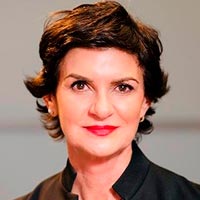Master’s Degree in Political Communication and Crisis and Emergency Management
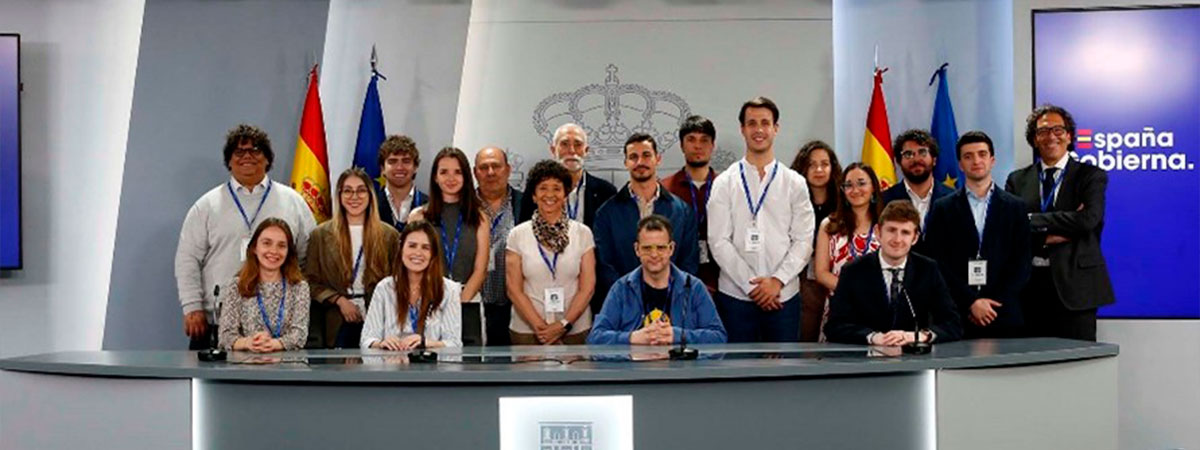
Specialize in political communication and its communication and marketing strategies in institutions, cabinets, consultancies or political parties
The Master's Degree in Political Communication and Crisis and Emergency Management teaches students how to transform communication into an adequate and essential instrument with which organizations of all kinds meet their objectives and serve society. In addition, the program includes the areas of crisis and reputation management and emergency resolution in the communication environment.
Communication permeates all levels of politics that interact with the social sphere, both from institutions as well as private companies that must regulate dealings with power. The institutional situation in Spain, and in the rest of the surrounding countries, is undergoing substantial changes that imply a correct use of communication, transformed in recent years by the new paradigm of digitalization.
This official degree, which is endorsed by the Political Communication Association (ACOP), aims to offer students comprehensive, advanced, specialized and transversal education to face Political Communication with an international and global perspective at a delicate moment, which is prone to the proliferation of disinformation and fake news. Likewise, it aims to teach them to handle the digital tools that have broken into the communication processes, such as bots, deepfakes, in short, artificial intelligence that makes highly controlled strategies necessary both in electoral processes, and in situations of reputation crisis management or emergencies for private companies and non-governmental organizations. These strategies are developed in both the public and private spheres.

With the guarantee of the Political Communication Association (ACOP)
Our master's degree has the guarantee of the Political Communication Association (ACOP), a forum for the exchange of knowledge, opinions and experiences of information and political communication professionals.
The Master combines the acquisition of knowledge in the field of communication and political marketing with solid notions of contemporary political analysis.
Regular collaborating companies in the master's degree
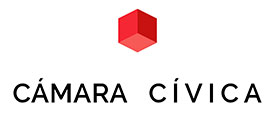


Master's degree with professional and research orientation
Curriculum
BOE núm. 173, de 20 de julio de 2022
All our degrees and curricula have been prepared in accordance with the new guidelines set by current legislation, having already been verified by the National Agency for Quality Assessment.
The student must take 60 credits
First Semester 30 ECTS credits
From October to January, both included- 3 ECTS | Institutional structure and analysis of the communication environment
- 3 ECTS | Strategic Communication Management: Intangibles Management and Corporate Reputation
- 3 ECTS | Fundamentals of protocol in organizational communication
- 3 ECTS | Design and Planning of Institutional Communication Campaigns I: society, audiences, strategic trends and creation processes
- 3 ECTS | Design and Planning of Institutional Communication Campaigns II: strategic plan and assessment of effectiveness
- 3 ECTS | Communication in crisis and emergencies
- 3 ECTS | Media planning and relations with the press in crisis and conflicts
- 3 ECTS | Post-crisis management models
- 3 ECTS | National and international political environment
- 3 ECTS | Data analysis for political communication: propaganda, political marketing, mediatization and cyberpolitics
Second Semester 32 ECTS credits
From February to June, both included- 3 ECTS | Design and Planning of Electoral Campaigns I: political sociology, electoral strategy and legal problems
- 3 ECTS | Design and Planning of Electoral Campaigns II: communication management and organization of electoral events and acts
- 3 ECTS | Disinformation and electoral campaigns: Microsegmentation in social media and Fake News
- 3 ECTS | Spokesperson and public speech
- 3 ECTS | Political consulting and image
- 3 ECTS | Political consulting and image
- 6 ECTS | Master's Final Research Project
- 6 ECTS | Professional internships (business internships)
- 6 ECTS | Research Methodology in Communication Sciences
More info about the subjects
Professors
| Profesores Professors | Porcentaje de Doctores (ECTS) Percentage of PhD holders (ECTS) |
| 30 | 64% |
 David del Pino Díaz
Director del Máster en Comunicación Política y Gestión de Crisis y Emergencias.
David del Pino Díaz
Director del Máster en Comunicación Política y Gestión de Crisis y Emergencias. Profesor de Estructura Institucional y Análisis del entorno comunicacional y Trabajo fin de Máster Director of the Master's Degree in Political Communication and Crisis and Emergency Management.
Professor of Institutional Structure and Analysis of the communication environment Doctor en Sociología de la Cultura y Máster en comunicación política por la Universidad Complutense de Madrid. Graduado en Ciencias Políticas. . Acreditado por ANECA. Ha centrado su carrera investigadora en cómo se construye el carisma en las sociedades contemporáneas, la centralidad del campo mediático como actor primordial dentro del campo de poder, y en la conformación de mitos políticos a través de series de televisión. También es profesor en el Grado de Publicidad y Relaciones Públicas de la Facultad de Comunicación y Artes de la universidad Nebrija.
 Carmen Torres Narvaez
Coordinadora de Asuntos Públicos del Máster en Comunicación Política y Gestión de Crisis y Emergencias.
Carmen Torres Narvaez
Coordinadora de Asuntos Públicos del Máster en Comunicación Política y Gestión de Crisis y Emergencias. Profesora de Desinformación y campañas electorales: microsegmentación en RRSS y Fake News. Public Affairs Coordinator for the Master's in Political Communication and Crisis and Emergency Management.
Professor of Disinformation and electoral campaigns: Microsegmentation in RRSS and Fake news Doctora en Ciencias de la Información por la Universidad Complutense de Madrid. Licenciada en Periodismo, Comunicación Audiovisual, Publicidad y Relaciones Públicas en la Universidad Nebrija. Posee el Máster Universitario en Comunicación Institucional y Política por la Universidad de Sevilla (2012). Ha formado parte del gabinete de prensa de la Universidad de Málaga. De 2014 a 2017 dirigió la comunicación de la Organización de Estados Iberoamericanos para la Educación, la Ciencia y la Cultura (OEI). En la actualidad es responsable de relaciones institucionales del Espacio Iberoamericano del Conocimiento en la Secretaría General Iberoamericana (SEGIB), organismo responsable de las Cumbres Iberoamericanas de Jefes de Estado y de Gobierno.
 Daniel Ayllón Martínez
Profesor de Planificación de medios y relaciones con la prensa en crisis y conflictos
Professor of Media Planning and Press Relations in Crises and Conflicts
Actual director de gabinete del Ministro de Consumo. Desde 2015, es asesor de Comunicación Política: jefe de prensa de grupo parlamentario en el Congreso de los Diputados (2015-2019) y director de comunicación en el Ministerio de Consumo (2020-2023). Ha participado en 16 campañas electorales. Previamente, trabajó 15 años como periodista, en los que formó parte del equipo fundador de tres publicaciones (Público, La Marea y Ahora) y colaboró con programas de radio y televisión. Licenciado en Periodismo (Universidad Complutense de Madrid), Executive Master in Public Administration (ESADE), Diplomado en Comunicación Política y Campañas Electorales (UNTREF, Buenos Aires) y Técnico en Comunicación Integral (Universidad Francisco de Vitoria).
Daniel Ayllón Martínez
Profesor de Planificación de medios y relaciones con la prensa en crisis y conflictos
Professor of Media Planning and Press Relations in Crises and Conflicts
Actual director de gabinete del Ministro de Consumo. Desde 2015, es asesor de Comunicación Política: jefe de prensa de grupo parlamentario en el Congreso de los Diputados (2015-2019) y director de comunicación en el Ministerio de Consumo (2020-2023). Ha participado en 16 campañas electorales. Previamente, trabajó 15 años como periodista, en los que formó parte del equipo fundador de tres publicaciones (Público, La Marea y Ahora) y colaboró con programas de radio y televisión. Licenciado en Periodismo (Universidad Complutense de Madrid), Executive Master in Public Administration (ESADE), Diplomado en Comunicación Política y Campañas Electorales (UNTREF, Buenos Aires) y Técnico en Comunicación Integral (Universidad Francisco de Vitoria).
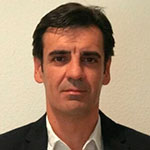 Javier Ayuso Rojo
Profesor de Comunicación en crisis y emergencias
Professor of Communication in crisis and emergencies
Licenciado en Periodismo por la Universidad Complutense de Madrid.
Especializado en comunicación de emergencias desde hace más de 20 años. Coordinador del Gabinete de Comunicación de Emergencias 112 Comunidad de Madrid. Durante su trayectoria profesional ha gestionado la información de grandes sucesos, como los atentados del 11 de marzo de 2004, el incendio en el edificio Windsor de Madrid, el atentado en la Terminal 4 del Aeropuerto de Barajas en 2006, o la borrasca Filomena.
Medalla al Mérito de Protección Civil concedida por la Dirección General de Protección Civil y Emergencias del Ministerio del Interior en 2018 al equipo de comunicación de Emergencias 112 Comunidad de Madrid.
Ha participado, como experto internacional, en el programa PPRD (Prevention, Preparedness and Response to Disasters) de la Unión Europea.
Javier Ayuso Rojo
Profesor de Comunicación en crisis y emergencias
Professor of Communication in crisis and emergencies
Licenciado en Periodismo por la Universidad Complutense de Madrid.
Especializado en comunicación de emergencias desde hace más de 20 años. Coordinador del Gabinete de Comunicación de Emergencias 112 Comunidad de Madrid. Durante su trayectoria profesional ha gestionado la información de grandes sucesos, como los atentados del 11 de marzo de 2004, el incendio en el edificio Windsor de Madrid, el atentado en la Terminal 4 del Aeropuerto de Barajas en 2006, o la borrasca Filomena.
Medalla al Mérito de Protección Civil concedida por la Dirección General de Protección Civil y Emergencias del Ministerio del Interior en 2018 al equipo de comunicación de Emergencias 112 Comunidad de Madrid.
Ha participado, como experto internacional, en el programa PPRD (Prevention, Preparedness and Response to Disasters) de la Unión Europea.
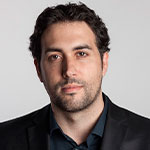 Eduardo Bayón García
Profesor de Diseño y planificación de campañas de comunicación institucional I: sociedad, públicos, tendencias estratégicas y procesos de creación
Professor of Design and planning of institutional communication campaigns I: society, audiences, strategic trends and creation processes
Consultor en comunicación pública y estrategia. Entre las materias de su labor profesional se encuentran, además de la comunicación y el liderazgo, el análisis político y electoral. También es colaborador habitual en diferentes medios de comunicación, tanto escritos, como radiofónicos. Doctorando en Ciencia Política; es Graduado en Ciencias Políticas y Administración por la UNED; con Máster en Derechos Fundamentales; Experto Universitario en Relaciones Institucionales y Protocolo; y Licenciado en Derecho por la Universidad de Oviedo.
Eduardo Bayón García
Profesor de Diseño y planificación de campañas de comunicación institucional I: sociedad, públicos, tendencias estratégicas y procesos de creación
Professor of Design and planning of institutional communication campaigns I: society, audiences, strategic trends and creation processes
Consultor en comunicación pública y estrategia. Entre las materias de su labor profesional se encuentran, además de la comunicación y el liderazgo, el análisis político y electoral. También es colaborador habitual en diferentes medios de comunicación, tanto escritos, como radiofónicos. Doctorando en Ciencia Política; es Graduado en Ciencias Políticas y Administración por la UNED; con Máster en Derechos Fundamentales; Experto Universitario en Relaciones Institucionales y Protocolo; y Licenciado en Derecho por la Universidad de Oviedo.
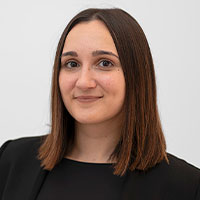 Tania Brandariz Portela
Profesora de Análisis de datos para la comunicación política: propaganda, marketing politica, mediatización y ciberpolítica
Professor of Data analysis for political communication: propaganda, political marketing, mediatization and cyberpolitics
Doctora en Periodismo por la Universidad Complutense de Madrid. Acreditada por ANECA. Máster Universitario en Estudios Avanzados en Comunicación Política. Profesora de Opinión Pública y Marketing Político. Investiga sobre los marcos de interpretación políticos del feminismo y el antifeminismo, publicando artículos científicos y capítulos de libro sobre la temática. Pertenece al grupo de investigación Estudios literarios y culturales y estudios de género, en la Universidad Complutense de Madrid. Por otro lado, ha colaborado con European Journalism Observatory, The Conversation y la Revista de la Asociación de Comunicación Política.
Tania Brandariz Portela
Profesora de Análisis de datos para la comunicación política: propaganda, marketing politica, mediatización y ciberpolítica
Professor of Data analysis for political communication: propaganda, political marketing, mediatization and cyberpolitics
Doctora en Periodismo por la Universidad Complutense de Madrid. Acreditada por ANECA. Máster Universitario en Estudios Avanzados en Comunicación Política. Profesora de Opinión Pública y Marketing Político. Investiga sobre los marcos de interpretación políticos del feminismo y el antifeminismo, publicando artículos científicos y capítulos de libro sobre la temática. Pertenece al grupo de investigación Estudios literarios y culturales y estudios de género, en la Universidad Complutense de Madrid. Por otro lado, ha colaborado con European Journalism Observatory, The Conversation y la Revista de la Asociación de Comunicación Política.
 Francisco Camas García
Profesor de Diseño y Planificación de campañas electorales I: sociología política, estrategia electoral y problemática jurídica
Professor of Design and Planning of electoral campaigns I: political sociology, electoral strategy and legal problems
Es doctor en Ciencias Sociales y Licenciado en Ciencias Políticas y de la Administración por la Universidad de Granada. Actualmente es director de investigación de Opinión Pública de Ipsos España. Cuenta con más de 10 años de experiencia nacional e internacional como investigador y consultor de encuestas sociales y electorales. Es profesor de sociología en el Instituto de Estudios Bursátiles y ha impartido clases de ciencia política y metodología en la Universidad Carlos III de Madrid y la Universidad Autónoma de Madrid. Fundador de la consultora Elemental Research. Colaborador habitual en medios de comunicación como RNE, TVE y Canal Sur.
Francisco Camas García
Profesor de Diseño y Planificación de campañas electorales I: sociología política, estrategia electoral y problemática jurídica
Professor of Design and Planning of electoral campaigns I: political sociology, electoral strategy and legal problems
Es doctor en Ciencias Sociales y Licenciado en Ciencias Políticas y de la Administración por la Universidad de Granada. Actualmente es director de investigación de Opinión Pública de Ipsos España. Cuenta con más de 10 años de experiencia nacional e internacional como investigador y consultor de encuestas sociales y electorales. Es profesor de sociología en el Instituto de Estudios Bursátiles y ha impartido clases de ciencia política y metodología en la Universidad Carlos III de Madrid y la Universidad Autónoma de Madrid. Fundador de la consultora Elemental Research. Colaborador habitual en medios de comunicación como RNE, TVE y Canal Sur.
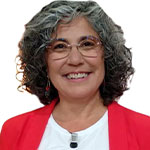 María del Mar Castro Maestre
Profesora de Consultoría e Imagen política
Professor of Consulting and Political Image
Doctora en Comunicación por la Universidad de Vigo. Acreditada por ANECA.
Profesora universitaria y asesora empresarial en España y Latinoamérica.
Autora de siete publicaciones y creadora del blog de comunicación: https://www.marcastro.es
Ganadora The Napolitan Victory Awards 2019, categoría Mujeres Influyentes COMPOL.
Referente gallega en Comunicación, reconocimiento concedido por Executivas de Galicia.
María del Mar Castro Maestre
Profesora de Consultoría e Imagen política
Professor of Consulting and Political Image
Doctora en Comunicación por la Universidad de Vigo. Acreditada por ANECA.
Profesora universitaria y asesora empresarial en España y Latinoamérica.
Autora de siete publicaciones y creadora del blog de comunicación: https://www.marcastro.es
Ganadora The Napolitan Victory Awards 2019, categoría Mujeres Influyentes COMPOL.
Referente gallega en Comunicación, reconocimiento concedido por Executivas de Galicia.
 Javier Chivite Fernández
Profesor de Comunicación en Crisis y emergencias
Professor of Crisis and Emergency Communication
Doctor en Periodismo por la Universidad Complutense de Madrid. Acreditado por ANECA. Licenciado en Periodismo, es profesor universitario desde el año 2005. Ha trabajado en la cadena COPE, en la diputación de Toledo y en Radio Intercontinental. En la actualidad, es portavoz del Centro de Emergencias 112 de la Comunidad de Madrid, colaborando en la gestión de la comunicación en situaciones de crisis y emergencias como la nevada que originó la borrasca Filomena, incendios forestales y fenómenos meteorológicos adversos. Está en posesión de la Medalla al Mérito de Protección Civil en la categoría de Bronce y con distintivo Blanco concedida por la Dirección General de Protección Civil y Emergencias del Ministerio del Interior en 2018 al equipo de comunicación de Emergencias 112 Comunidad de Madrid.
Javier Chivite Fernández
Profesor de Comunicación en Crisis y emergencias
Professor of Crisis and Emergency Communication
Doctor en Periodismo por la Universidad Complutense de Madrid. Acreditado por ANECA. Licenciado en Periodismo, es profesor universitario desde el año 2005. Ha trabajado en la cadena COPE, en la diputación de Toledo y en Radio Intercontinental. En la actualidad, es portavoz del Centro de Emergencias 112 de la Comunidad de Madrid, colaborando en la gestión de la comunicación en situaciones de crisis y emergencias como la nevada que originó la borrasca Filomena, incendios forestales y fenómenos meteorológicos adversos. Está en posesión de la Medalla al Mérito de Protección Civil en la categoría de Bronce y con distintivo Blanco concedida por la Dirección General de Protección Civil y Emergencias del Ministerio del Interior en 2018 al equipo de comunicación de Emergencias 112 Comunidad de Madrid.
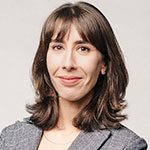 Diana Cortecero Esquivel
Profesora de Modelos de gestión postcrisis
Professor of Post-Crisis Management Models
Licenciada en Comunicación por la Universidad Complutense de Madrid, cuenta con más de 17 años de experiencia en comunicación corporativa y financiera asesorando a clientes de los sectores financiero, energético, consultoría e industria cultural, entre otros. Actualmente forma parte del equipo de la consultora estratégica [harmon.es]Harmon. Antes de su incorporación a esta firma, desarrolló su carrera como directora de cuentas en la agencia Comco, y anteriormente como consultora en Estudio de Comunicación, donde participó también en la coordinación del área de formación de portavoces y gestión de la red internacional de la compañía.
Además, ha colaborado en medios como Forbes, El Publicista o El Periódico de la Publicidad y dirige la plataforma de apoyo a la música española LaFonoteca.
Diana Cortecero Esquivel
Profesora de Modelos de gestión postcrisis
Professor of Post-Crisis Management Models
Licenciada en Comunicación por la Universidad Complutense de Madrid, cuenta con más de 17 años de experiencia en comunicación corporativa y financiera asesorando a clientes de los sectores financiero, energético, consultoría e industria cultural, entre otros. Actualmente forma parte del equipo de la consultora estratégica [harmon.es]Harmon. Antes de su incorporación a esta firma, desarrolló su carrera como directora de cuentas en la agencia Comco, y anteriormente como consultora en Estudio de Comunicación, donde participó también en la coordinación del área de formación de portavoces y gestión de la red internacional de la compañía.
Además, ha colaborado en medios como Forbes, El Publicista o El Periódico de la Publicidad y dirige la plataforma de apoyo a la música española LaFonoteca.
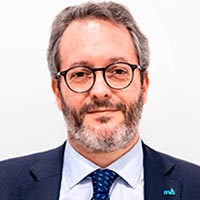 Jesús Espino González
Profesor de Diseño y Planificación de Campañas institucionales II: Plan estratégico y evaluación de eficacia.
Professor of Design and Planning of Institutional Campaigns II: Strategic plan and effectiveness evaluation.
Licenciado en Periodismo (EADE, 1995-1999). Máster en Gestión de la Comunicación Política y Electoral (UAB, 2010-2011). Máster en investigación sobre medios de comunicación, audiencias y práctica profesional en Europa (UMA, 2016-2019). Cursando grado en Ciencia Política y de la Administración (UNED) y doctorado en Educación y Comunicación Social (UMA). Coordinador general de Comunicación del Ayuntamiento de Málaga desde enero de 2024. Director general de Comunicación del Ayuntamiento de Málaga (2011-2024).
Jesús Espino González
Profesor de Diseño y Planificación de Campañas institucionales II: Plan estratégico y evaluación de eficacia.
Professor of Design and Planning of Institutional Campaigns II: Strategic plan and effectiveness evaluation.
Licenciado en Periodismo (EADE, 1995-1999). Máster en Gestión de la Comunicación Política y Electoral (UAB, 2010-2011). Máster en investigación sobre medios de comunicación, audiencias y práctica profesional en Europa (UMA, 2016-2019). Cursando grado en Ciencia Política y de la Administración (UNED) y doctorado en Educación y Comunicación Social (UMA). Coordinador general de Comunicación del Ayuntamiento de Málaga desde enero de 2024. Director general de Comunicación del Ayuntamiento de Málaga (2011-2024).
 Juan Ignacio Estévez Rubín de Celis
Profesor de Entorno político nacional e internacional
Professor of National and International Political Environment
Politólogo, Doctor en Ciencia Política (UCM), máster en estudios de América Latina. Su investigación se centra en entender el impacto de las ideas y discursos políticos en las instituciones. Además de la docencia e investigación, se ha desempeñado en la gestión académica, evaluación de proyectos, evaluación de sistemas de garantía de calidad o en la elaboración de informes de gestión y consultoría.
Juan Ignacio Estévez Rubín de Celis
Profesor de Entorno político nacional e internacional
Professor of National and International Political Environment
Politólogo, Doctor en Ciencia Política (UCM), máster en estudios de América Latina. Su investigación se centra en entender el impacto de las ideas y discursos políticos en las instituciones. Además de la docencia e investigación, se ha desempeñado en la gestión académica, evaluación de proyectos, evaluación de sistemas de garantía de calidad o en la elaboración de informes de gestión y consultoría.
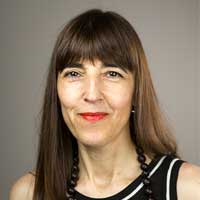 Mercedes Herrero de la Fuente
Profesora de Metodología de la investigación en Ciencias de la Comunicación y Trabajo fin de Máster
Professor of Research Methodology in Communication Sciences
Doctora en Ciencias de la Información por la Universidad Complutense de Madrid y profesora acreditada para universidad pública y privada por la ACAP. Máster en Periodismo Radiofónico (Universidad Complutense de Madrid) y Máster en Lingüística Aplicada (Universidad Antonio de Nebrija).
Coordinadora del Programa de Doctorado Innovación en Comunicación Digital y Medios (Facultad de Comunicación de Artes, Universidad Antonio de Nebrija). Miembro del claustro permanente de la Universidad Nebrija desde 2015, donde ha dirigido el Máster en Periodismo Digital y de Datos (2016-2021) y el Máster en Periodismo en Televisión (2015-2019) y participado en el diseño académico de otros postgrados, como el Máster en Periodismo y Retransmisiones Deportivas. En esta universidad imparte clase en grado y postgrado. En asignaturas relacionadas con la producción televisiva, la realización de documentales y reportajes y la actualidad internacional. Ha sido docente en otras universidades, como la UCM y la Universidad Camilo José Cela, en especial en el área de postgrado. Ha desarrollado su labor investigadora en diferentes universidades extranjeras, como la Cornell University (EE.UU.), la University of Salford (Reino Unido), la Radboud Universiteit (Países Bajos) y la Univerzita Karlova (República Checa).
Mercedes Herrero de la Fuente
Profesora de Metodología de la investigación en Ciencias de la Comunicación y Trabajo fin de Máster
Professor of Research Methodology in Communication Sciences
Doctora en Ciencias de la Información por la Universidad Complutense de Madrid y profesora acreditada para universidad pública y privada por la ACAP. Máster en Periodismo Radiofónico (Universidad Complutense de Madrid) y Máster en Lingüística Aplicada (Universidad Antonio de Nebrija).
Coordinadora del Programa de Doctorado Innovación en Comunicación Digital y Medios (Facultad de Comunicación de Artes, Universidad Antonio de Nebrija). Miembro del claustro permanente de la Universidad Nebrija desde 2015, donde ha dirigido el Máster en Periodismo Digital y de Datos (2016-2021) y el Máster en Periodismo en Televisión (2015-2019) y participado en el diseño académico de otros postgrados, como el Máster en Periodismo y Retransmisiones Deportivas. En esta universidad imparte clase en grado y postgrado. En asignaturas relacionadas con la producción televisiva, la realización de documentales y reportajes y la actualidad internacional. Ha sido docente en otras universidades, como la UCM y la Universidad Camilo José Cela, en especial en el área de postgrado. Ha desarrollado su labor investigadora en diferentes universidades extranjeras, como la Cornell University (EE.UU.), la University of Salford (Reino Unido), la Radboud Universiteit (Países Bajos) y la Univerzita Karlova (República Checa).
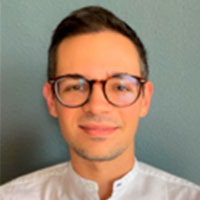 Álvaro Lario Ruiz
Profesor de Diseño y planificación de campañas electorales I: sociología política, estrategia electoral y problemática jurídica
Professor of Design and planning of electoral campaigns I: political sociology, electoral strategy and legal problems
Graduado en Ciencias Políticas con mención en Periodismo por la Universidad Carlos III de Madrid. Máster en Formación del Profesorado por la Universidad Rey Juan Carlos. Cuenta con formación especializada en Marketing y Negociación por la Universidad Claude Bernard de Lyon. En la actualidad trabaja como profesor de Economía en Enseñanza Secundaria, Bachillerato y FP en centros públicos y concertados de la Comunidad de Madrid. Ha trabajado en asesoría de comunicación en instituciones como el Congreso de los Diputados (2018-2021), el Ministerio de Transportes, Movilidad y Agenda Urbana (2021-2023), el Consejo Superior de Deportes (2023) o la Fundación Hay Derecho (2016-2017). También ha impartido programas formativos de comunicación política y liderazgo en la Universidad Nacional Autónoma de Honduras y colaborado en diversos medios como analista.
Álvaro Lario Ruiz
Profesor de Diseño y planificación de campañas electorales I: sociología política, estrategia electoral y problemática jurídica
Professor of Design and planning of electoral campaigns I: political sociology, electoral strategy and legal problems
Graduado en Ciencias Políticas con mención en Periodismo por la Universidad Carlos III de Madrid. Máster en Formación del Profesorado por la Universidad Rey Juan Carlos. Cuenta con formación especializada en Marketing y Negociación por la Universidad Claude Bernard de Lyon. En la actualidad trabaja como profesor de Economía en Enseñanza Secundaria, Bachillerato y FP en centros públicos y concertados de la Comunidad de Madrid. Ha trabajado en asesoría de comunicación en instituciones como el Congreso de los Diputados (2018-2021), el Ministerio de Transportes, Movilidad y Agenda Urbana (2021-2023), el Consejo Superior de Deportes (2023) o la Fundación Hay Derecho (2016-2017). También ha impartido programas formativos de comunicación política y liderazgo en la Universidad Nacional Autónoma de Honduras y colaborado en diversos medios como analista.
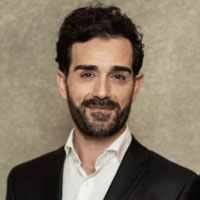 Luis Marañón Martín
Profesor de Lobbying y Campañas de movilización
Professor of Lobbying and Mobilization Campaigns
Politólogo y consultor en asuntos públicos, estrategia corporativa y comunicación pública. Cuenta con más de dos décadas de actividad prestando servicios profesionales a compañías, grupos de interés, gobiernos, instituciones, partidos políticos y organizaciones sociales. Es co-editor de referencia con publicaciones como Asuntos públicos . Lobby y diplomacia corporativa (Dykinson) o ¿Existe el lobby ciudadano? Una experiencia de participación en el Congreso de los Diputados. (Revista de las Cortes Generales)
Luis Marañón Martín
Profesor de Lobbying y Campañas de movilización
Professor of Lobbying and Mobilization Campaigns
Politólogo y consultor en asuntos públicos, estrategia corporativa y comunicación pública. Cuenta con más de dos décadas de actividad prestando servicios profesionales a compañías, grupos de interés, gobiernos, instituciones, partidos políticos y organizaciones sociales. Es co-editor de referencia con publicaciones como Asuntos públicos . Lobby y diplomacia corporativa (Dykinson) o ¿Existe el lobby ciudadano? Una experiencia de participación en el Congreso de los Diputados. (Revista de las Cortes Generales)
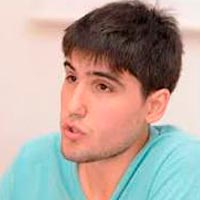 Miguel Ángel Martín Blanco
Profesor de Metodología de la investigación en Ciencias de la Comunicación
Professor of Research Methodology in Communication Sciences
Doctor en Periodismo por la Universidad Complutense de Madrid. Acreditado Ayudante doctor por ANECA. Licenciado en Filosofía por la Universidad de Valladolid, investigador en formación (FPI) dentro del proyecto I+D 'El periodista como historiador del presente. Análisis del documento en las nuevas formas de la información' (CSO2014-55527-P) y doctor en Periodismo con una tesis titulada: “El Estado Islámico, un universo semiótico. Análisis de la revista Dabiq” / “Der Islamische Staat, ein semiotisches Universum. Analyse des Dabiq-Magazins”. Me he formado en el Grupo de Estudios de Semiótica de la Cultura (GESC), soy miembro del Comité Asesor de la revista DeSignis y miembro fundador de Diacronía. He sido Colaborador Honorífico del Departamento de Periodismo y Nuevos Medios de la UCM, vocal de la Asociación Española de Semiótica (AES) y he colaborado con las tareas docentes de la asignatura de Semiótica de la Comunicación de Masas y Semiótica de la Cultura en la UCM.
Miguel Ángel Martín Blanco
Profesor de Metodología de la investigación en Ciencias de la Comunicación
Professor of Research Methodology in Communication Sciences
Doctor en Periodismo por la Universidad Complutense de Madrid. Acreditado Ayudante doctor por ANECA. Licenciado en Filosofía por la Universidad de Valladolid, investigador en formación (FPI) dentro del proyecto I+D 'El periodista como historiador del presente. Análisis del documento en las nuevas formas de la información' (CSO2014-55527-P) y doctor en Periodismo con una tesis titulada: “El Estado Islámico, un universo semiótico. Análisis de la revista Dabiq” / “Der Islamische Staat, ein semiotisches Universum. Analyse des Dabiq-Magazins”. Me he formado en el Grupo de Estudios de Semiótica de la Cultura (GESC), soy miembro del Comité Asesor de la revista DeSignis y miembro fundador de Diacronía. He sido Colaborador Honorífico del Departamento de Periodismo y Nuevos Medios de la UCM, vocal de la Asociación Española de Semiótica (AES) y he colaborado con las tareas docentes de la asignatura de Semiótica de la Comunicación de Masas y Semiótica de la Cultura en la UCM.
 Ángela Paloma Martín González
Profesora de Diseño y Planificación de Campañas de Comunicación Institucional I: sociedad, públicos, tendencias estratégicas y procesos de creación
Professor of Fundamentals of Protocol in Organizational Communication
Doctora Cum Laude con Premio Extraordinario en Estudios de Género, Culturas, Sociedades y Políticas (URV). Atesora más de quince años de trayectoria profesional en más de seis países como consultora política y corporativa. Profesora asociada de la Universidad Carlos III de Madrid. Ha sido asesora del presidente del Gobierno desde la Dirección Adjunta, la Unidad de Mensaje, la Dirección de Asuntos Políticos y la Dirección de la Unión Europea. Ha sido directora del Gabinete del ministro de Industria, Comercio y Turismo; directora de Gabinete de la Secretaría de Estado de Digitalización e Inteligencia Artificial; y asesora en el Gabinete del Ministerio del Interior. Ha sido consejera de AENA, Red.es, Incibe y Mayasa. Dirigió la consultora Ideograma desde Latinoamérica. The Washington Academy of Political Arts & Sciences la premió en 2016 por ser una de las mujeres más influyentes en su profesión.
Ángela Paloma Martín González
Profesora de Diseño y Planificación de Campañas de Comunicación Institucional I: sociedad, públicos, tendencias estratégicas y procesos de creación
Professor of Fundamentals of Protocol in Organizational Communication
Doctora Cum Laude con Premio Extraordinario en Estudios de Género, Culturas, Sociedades y Políticas (URV). Atesora más de quince años de trayectoria profesional en más de seis países como consultora política y corporativa. Profesora asociada de la Universidad Carlos III de Madrid. Ha sido asesora del presidente del Gobierno desde la Dirección Adjunta, la Unidad de Mensaje, la Dirección de Asuntos Políticos y la Dirección de la Unión Europea. Ha sido directora del Gabinete del ministro de Industria, Comercio y Turismo; directora de Gabinete de la Secretaría de Estado de Digitalización e Inteligencia Artificial; y asesora en el Gabinete del Ministerio del Interior. Ha sido consejera de AENA, Red.es, Incibe y Mayasa. Dirigió la consultora Ideograma desde Latinoamérica. The Washington Academy of Political Arts & Sciences la premió en 2016 por ser una de las mujeres más influyentes en su profesión.
 Victoria Isabel Moreno Gil
Profesora tutora de Prácticas profesionales
Tutor Professor of Professional Practices
Doctora en Periodismo por la Universidad Carlos III de Madrid y licenciada en Periodismo y Comunicación Audiovisual por la misma universidad.
Combina su labor docente con la de investigadora en el campo de la ética periodística y la alfabetización mediática. Ha participado como ponente en distintos seminarios académicos y, recientemente, ha realizado una estancia postdoctoral en calidad de profesora visitante en la Universidad Pompeu Fabra.
Su trayectoria profesional está ligada a la docencia y al ejercicio del periodismo en distintos medios de comunicación como redactora: principalmente en televisión (El Mundo TV, Intereconomía), pero también en radio (Cadena Ser), agencia de noticias (EFE) y medios digitales. Asimismo, cuenta con una dilatada experiencia en la cobertura de eventos mediáticos, elaboración de guiones y reportajes audiovisuales como freelance
En el marco de la educación no formal, ha impartido clases de Inglés y de Lengua y Literatura.
Victoria Isabel Moreno Gil
Profesora tutora de Prácticas profesionales
Tutor Professor of Professional Practices
Doctora en Periodismo por la Universidad Carlos III de Madrid y licenciada en Periodismo y Comunicación Audiovisual por la misma universidad.
Combina su labor docente con la de investigadora en el campo de la ética periodística y la alfabetización mediática. Ha participado como ponente en distintos seminarios académicos y, recientemente, ha realizado una estancia postdoctoral en calidad de profesora visitante en la Universidad Pompeu Fabra.
Su trayectoria profesional está ligada a la docencia y al ejercicio del periodismo en distintos medios de comunicación como redactora: principalmente en televisión (El Mundo TV, Intereconomía), pero también en radio (Cadena Ser), agencia de noticias (EFE) y medios digitales. Asimismo, cuenta con una dilatada experiencia en la cobertura de eventos mediáticos, elaboración de guiones y reportajes audiovisuales como freelance
En el marco de la educación no formal, ha impartido clases de Inglés y de Lengua y Literatura.
 Virginia Navarro Mangado
Profesora de Prácticas profesionales (prácticas empresariales)
Professor of Professional Practices (Business Internships)
Doctora en Comunicación Audiovisual y Publicidad por la Universidad Complutense de Madrid. Desde 1992 ha desarrollado su actividad profesional como Consultora de Comunicación, especialista en Procesos de Influencia para diversas instituciones entre las que destacan el Ministerio de Defensa (ISFAS), Instituto de Empresa, Ilustre Colegio de Abogados de Madrid, Visa Citibank España, American Express, Ayuntamiento de Cuenca, Cepsa, NH Hoteles, Unión Fenosa, Telefónica de España, Instituto Vasco de Administraciones Públicas, Grupo Popular, Santa Lucía Seguros, Laboratorios Wyeth, Morgan Stanley, Antena 3, Iberia, Grupo Cortefiel, Sage, DHL, Crédito y Caución o la Junta de Extremadura. También es directora de Comunicación, Marketing y Recursos Humanos en Security World Wide, S.L.: Diseño, organización y ejecución de las estrategias de comunicación de los espacios dedicados a organización de eventos y espacios de ventas temporales.
Como docente ha diseñado e impartido programas formativos en grados y postgrados universitarios (Universidad Nebrija y UCM) y ciclos técnicos superiores (Cámara de Comercio de Madrid) y en su labor investigadora destaca su tesis doctoral (2015) “La incidencia de las campañas electorales en la construcción de la imagen de los hospitales. Las crisis en los hospitales madrileños.”
Virginia Navarro Mangado
Profesora de Prácticas profesionales (prácticas empresariales)
Professor of Professional Practices (Business Internships)
Doctora en Comunicación Audiovisual y Publicidad por la Universidad Complutense de Madrid. Desde 1992 ha desarrollado su actividad profesional como Consultora de Comunicación, especialista en Procesos de Influencia para diversas instituciones entre las que destacan el Ministerio de Defensa (ISFAS), Instituto de Empresa, Ilustre Colegio de Abogados de Madrid, Visa Citibank España, American Express, Ayuntamiento de Cuenca, Cepsa, NH Hoteles, Unión Fenosa, Telefónica de España, Instituto Vasco de Administraciones Públicas, Grupo Popular, Santa Lucía Seguros, Laboratorios Wyeth, Morgan Stanley, Antena 3, Iberia, Grupo Cortefiel, Sage, DHL, Crédito y Caución o la Junta de Extremadura. También es directora de Comunicación, Marketing y Recursos Humanos en Security World Wide, S.L.: Diseño, organización y ejecución de las estrategias de comunicación de los espacios dedicados a organización de eventos y espacios de ventas temporales.
Como docente ha diseñado e impartido programas formativos en grados y postgrados universitarios (Universidad Nebrija y UCM) y ciclos técnicos superiores (Cámara de Comercio de Madrid) y en su labor investigadora destaca su tesis doctoral (2015) “La incidencia de las campañas electorales en la construcción de la imagen de los hospitales. Las crisis en los hospitales madrileños.”
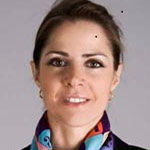 Ana Belén Oliver González
Profesora de Fundamentos del protocolo en la comunicación organizacional
Professor of Fundamentals of Protocol in Organizational Communication
Doctora en Ciencias Políticas y Relaciones Internacionales por la Universidad Complutense de Madrid. Acreditada por ANECA.
Profesora de Historia del Ceremonial y Protocolo en el Grado de Comunicación Corporativa y Dirección de Eventos, de la Universidad Nebrija, Madrid.
Profesora de las asignaturas Comunicación y Negociación; RSC; y Liderazgo; las tres en el Máster Universitario en Comunicación política y Empresarial de la Universidad Camilo José Cela, Madrid.
Ana Belén Oliver González
Profesora de Fundamentos del protocolo en la comunicación organizacional
Professor of Fundamentals of Protocol in Organizational Communication
Doctora en Ciencias Políticas y Relaciones Internacionales por la Universidad Complutense de Madrid. Acreditada por ANECA.
Profesora de Historia del Ceremonial y Protocolo en el Grado de Comunicación Corporativa y Dirección de Eventos, de la Universidad Nebrija, Madrid.
Profesora de las asignaturas Comunicación y Negociación; RSC; y Liderazgo; las tres en el Máster Universitario en Comunicación política y Empresarial de la Universidad Camilo José Cela, Madrid.
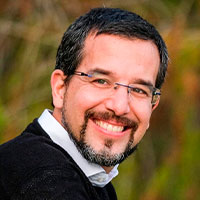 Sergio Pascual Peña
Profesor de Modelos de gestión postcrisis y Diseño y Planificación de Campañas de Comunicación Institucional I: sociedad, públicos, tendencias estratégicas y procesos de creación.
Professor of Post-crisis management models and Design and Planning of Institutional Communication Campaigns I: society, audiences, strategic trends and creation processes.
Analista político. Colabora desde 2019 en tertulias políticas en la Cadena Ser y en Canal Sur. Fue Secretario de Organización y miembro de su ejecutiva durante la fundación de Podemos en España (2014-2016) y ha sido diputado en el Congreso de este país durante las legislaturas XI y XII. Desde 2008 colabora en misiones de observación electoral y trabajos de consultoría, diseño y análisis demoscópico en Argentina, Colombia, Perú, Bolivia, México, Paraguay y Ecuador.
Sergio Pascual Peña
Profesor de Modelos de gestión postcrisis y Diseño y Planificación de Campañas de Comunicación Institucional I: sociedad, públicos, tendencias estratégicas y procesos de creación.
Professor of Post-crisis management models and Design and Planning of Institutional Communication Campaigns I: society, audiences, strategic trends and creation processes.
Analista político. Colabora desde 2019 en tertulias políticas en la Cadena Ser y en Canal Sur. Fue Secretario de Organización y miembro de su ejecutiva durante la fundación de Podemos en España (2014-2016) y ha sido diputado en el Congreso de este país durante las legislaturas XI y XII. Desde 2008 colabora en misiones de observación electoral y trabajos de consultoría, diseño y análisis demoscópico en Argentina, Colombia, Perú, Bolivia, México, Paraguay y Ecuador.
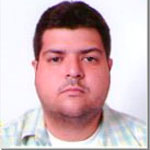 A. Javier Pereira Facón
Profesor de Diseño y planificación de campañas de comunicación institucional II: plan estratégico y evaluación de eficacia
Professor of Design and planning of institutional communication campaigns II: strategic plan and effectiveness evaluation
Licenciado en Periodismo de la Universidad Católica Andrés Bello, de Caracas. Especialista en Márketing Político. Premio IPYS Latinoamérica a la mejor cobertura electoral. Ha sido periodista, coordinación de investigación y gerente de contenidos interactivos en el diario El Nacional, de Caracas. Después de más de 10 años dedicándose a la comunicación digital orientada a la política, actualmente es el Responsable de Comunicación Digital y Redes Sociales de la Comunidad de Madrid.
A. Javier Pereira Facón
Profesor de Diseño y planificación de campañas de comunicación institucional II: plan estratégico y evaluación de eficacia
Professor of Design and planning of institutional communication campaigns II: strategic plan and effectiveness evaluation
Licenciado en Periodismo de la Universidad Católica Andrés Bello, de Caracas. Especialista en Márketing Político. Premio IPYS Latinoamérica a la mejor cobertura electoral. Ha sido periodista, coordinación de investigación y gerente de contenidos interactivos en el diario El Nacional, de Caracas. Después de más de 10 años dedicándose a la comunicación digital orientada a la política, actualmente es el Responsable de Comunicación Digital y Redes Sociales de la Comunidad de Madrid.
 Alberto Antonio Pérez Mesa
Profesor de Planificación de medios y relaciones con la prensa en crisis y conflictos y Portavocía y discurso público
Professor of Media Planning and Press Relations in Crises and Conflicts
Graduado en Marketing e Investigación de Mercados por la Universidad de Sevilla con Postgrado en Comunicación Política en la Universidad Camilo José Cela. Asesor de Relaciones Institucionales y Comunicación en la Embajada del Sultanato de Omán en España. Alberto Pérez cuenta con una amplia experiencia en comunicación política asesorando a líderes políticos y gestionando campañas electorales, una labor que ha sido reconocida por los Napolitan Victory Awards en 2021 y 2022 en Washington D.C. También ha desarrollado su carrera profesional en el ámbito de los asuntos públicos, impulsando estrategias de incidencia pública para compañías de primer nivel. Miembro del Comité Editorial de la revista de la Asociación de Comunicación Política (ACOP) y analista en Agenda Pública (El País).
Alberto Antonio Pérez Mesa
Profesor de Planificación de medios y relaciones con la prensa en crisis y conflictos y Portavocía y discurso público
Professor of Media Planning and Press Relations in Crises and Conflicts
Graduado en Marketing e Investigación de Mercados por la Universidad de Sevilla con Postgrado en Comunicación Política en la Universidad Camilo José Cela. Asesor de Relaciones Institucionales y Comunicación en la Embajada del Sultanato de Omán en España. Alberto Pérez cuenta con una amplia experiencia en comunicación política asesorando a líderes políticos y gestionando campañas electorales, una labor que ha sido reconocida por los Napolitan Victory Awards en 2021 y 2022 en Washington D.C. También ha desarrollado su carrera profesional en el ámbito de los asuntos públicos, impulsando estrategias de incidencia pública para compañías de primer nivel. Miembro del Comité Editorial de la revista de la Asociación de Comunicación Política (ACOP) y analista en Agenda Pública (El País).
 Francisco Javier Peytibi Carbonel
Profesor de Diseño y planificación de campañas electorales II: gestión de la comunicación y organización de eventos y actos electorales
Professor of Design and planning of electoral campaigns II: communication management and organization of electoral events and acts
Licenciado en Ciencias Políticas y Sociología por la Universidad Autónoma de Barcelona. Xavier Peytibi es consultor de comunicación política en ideograma, donde trabaja para 10 países en comunicación estratégica, campañas electorales y comunicación institucional. Es politólogo especializado en relaciones internacionales. Máster en sociedad del conocimiento, Postgrado en cultura de paz y Postgrado en estructura de la Unión Europea. Actualmente es doctorando en Ciencia Política
es consultor de comunicación política en ideograma, donde trabaja para 10 países en comunicación estratégica, campañas electorales y comunicación institucional. Es politólogo especializado en relaciones internacionales. Máster en sociedad del conocimiento, Postgrado en cultura de paz y Postgrado en estructura de la Unión Europea. Actualmente es doctorando en Ciencia Política
Francisco Javier Peytibi Carbonel
Profesor de Diseño y planificación de campañas electorales II: gestión de la comunicación y organización de eventos y actos electorales
Professor of Design and planning of electoral campaigns II: communication management and organization of electoral events and acts
Licenciado en Ciencias Políticas y Sociología por la Universidad Autónoma de Barcelona. Xavier Peytibi es consultor de comunicación política en ideograma, donde trabaja para 10 países en comunicación estratégica, campañas electorales y comunicación institucional. Es politólogo especializado en relaciones internacionales. Máster en sociedad del conocimiento, Postgrado en cultura de paz y Postgrado en estructura de la Unión Europea. Actualmente es doctorando en Ciencia Política
es consultor de comunicación política en ideograma, donde trabaja para 10 países en comunicación estratégica, campañas electorales y comunicación institucional. Es politólogo especializado en relaciones internacionales. Máster en sociedad del conocimiento, Postgrado en cultura de paz y Postgrado en estructura de la Unión Europea. Actualmente es doctorando en Ciencia Política
 Jonattan Rodríguez Hernández
Profesor de Análisis de datos para la comunicación política: propaganda, marketing político,mediatización y ciberpolítica
Professor of Data Analysis for Political Communication: Propaganda, Political Marketing, Mediatization, and Cyberpolitics
Fue contratado como investigador predoctoral en la Universidad Complutense de Madrid para la realización de su tesis doctoral en el marco del programa Banco Santander – UCM. Ha formado parte del Departamento de Periodismo y Nuevos Medios de la Facultad de Ciencias de la Información y participa en el proyecto de investigación Trazabilidad, transparencia y acceso a la información (ref. PR27/21-017). Sus líneas de investigación se centran en los estudios sobre movimientos sociales, el análisis de redes y la comunicación medioambiental. Ha realizado estancias de investigación en la Facultad de Ciencias Sociales de la Universidad de Salamanca (2022/2023) y en la Facultad de Ciencias Sociales, Jurídicas y de la Comunicación de la Universidad de Valladolid (2023/2024). Egresado en Altos Estudios de la Defensa Nacional en el VIII Curso de Defensa Nacional para Jóvenes del Centro Superior de Estudios de la Defensa Nacional (CESEDEN). Ha sido distinguido con el Premio Extraordinario del Grado en Periodismo y fue beneficiario de la Beca de Excelencia de la Comunidad de Madrid.
Jonattan Rodríguez Hernández
Profesor de Análisis de datos para la comunicación política: propaganda, marketing político,mediatización y ciberpolítica
Professor of Data Analysis for Political Communication: Propaganda, Political Marketing, Mediatization, and Cyberpolitics
Fue contratado como investigador predoctoral en la Universidad Complutense de Madrid para la realización de su tesis doctoral en el marco del programa Banco Santander – UCM. Ha formado parte del Departamento de Periodismo y Nuevos Medios de la Facultad de Ciencias de la Información y participa en el proyecto de investigación Trazabilidad, transparencia y acceso a la información (ref. PR27/21-017). Sus líneas de investigación se centran en los estudios sobre movimientos sociales, el análisis de redes y la comunicación medioambiental. Ha realizado estancias de investigación en la Facultad de Ciencias Sociales de la Universidad de Salamanca (2022/2023) y en la Facultad de Ciencias Sociales, Jurídicas y de la Comunicación de la Universidad de Valladolid (2023/2024). Egresado en Altos Estudios de la Defensa Nacional en el VIII Curso de Defensa Nacional para Jóvenes del Centro Superior de Estudios de la Defensa Nacional (CESEDEN). Ha sido distinguido con el Premio Extraordinario del Grado en Periodismo y fue beneficiario de la Beca de Excelencia de la Comunidad de Madrid.
 Manuel J. Rodríguez Morillo
Profesor de Lobbying y Campañas de movilización
Professor of Lobbying and Mobilization Campaigns
Politólogo y licenciado en Derecho. Consultor político y de innovación social. Analista político en diversos medios, ha trabajado como formador de actores políticos y sociales y es responsable de Incidencia Política de la Red Andaluza contra la Pobreza y la Exclusión Social (EAPN-Andalucía). Asimismo, es codirector de Cámara Cívica, empresa de economía social dedicada a acercar la política a la ciudadanía a través de la educación, el humor y la cultura pop y coordinador de Hateblockers, proyecto de innovación social en colaboración con el Gobierno de Aragón para crear una comunidad de jóvenes ciberactivistas contra el discurso de odio en internet.
Manuel J. Rodríguez Morillo
Profesor de Lobbying y Campañas de movilización
Professor of Lobbying and Mobilization Campaigns
Politólogo y licenciado en Derecho. Consultor político y de innovación social. Analista político en diversos medios, ha trabajado como formador de actores políticos y sociales y es responsable de Incidencia Política de la Red Andaluza contra la Pobreza y la Exclusión Social (EAPN-Andalucía). Asimismo, es codirector de Cámara Cívica, empresa de economía social dedicada a acercar la política a la ciudadanía a través de la educación, el humor y la cultura pop y coordinador de Hateblockers, proyecto de innovación social en colaboración con el Gobierno de Aragón para crear una comunidad de jóvenes ciberactivistas contra el discurso de odio en internet.
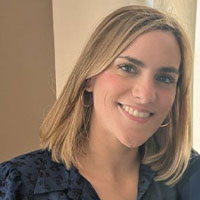 Victoria Sánchez García
Profesora de Modelo de Gestión Postcrisis
Professor of Post-Crisis Management Model.
Actualmente, ocupa el cargo de jefa de gabinete de la portavoz del grupo parlamentario Sumar en el Congreso de los Diputados. Anteriormente, ha formado parte del gabinete del Ministro de Universidades y ha sido asesora parlamentaria en el Parlament de Catalunya. Además, ha trabajado como consultora política en España y América Latina, participando en el diseño y desarrollo de campañas electorales a nivel nacional e internacional, tanto en Europa como en Latinoamérica.
Victoria Sánchez García
Profesora de Modelo de Gestión Postcrisis
Professor of Post-Crisis Management Model.
Actualmente, ocupa el cargo de jefa de gabinete de la portavoz del grupo parlamentario Sumar en el Congreso de los Diputados. Anteriormente, ha formado parte del gabinete del Ministro de Universidades y ha sido asesora parlamentaria en el Parlament de Catalunya. Además, ha trabajado como consultora política en España y América Latina, participando en el diseño y desarrollo de campañas electorales a nivel nacional e internacional, tanto en Europa como en Latinoamérica.
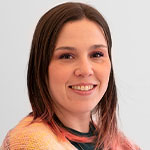 Celia Sancho Belinchón
Profesora de Dirección estratégica de la comunicación: gestión de intangibles y reputación corporativa
Professor of Strategic Communication Management: Management of Intangibles and Corporate Reputation
Celia Sancho Belinchón es doctora en Comunicación Audiovisual, Publicidad y Relaciones Públicas. Acreditada por ANECA. Está especializada en comunicación digital, estrategia de comunicación política y comunicación corporativa digital, siendo estas las áreas a las que ha dedicado ocho años de su carrera profesional. Durante los últimos años ha impartido asignaturas relativas a la gestión de contenidos digitales y la comunicación digital en los grados de Periodismo y Comunicación Corporativa. Actualmente es profesora en la facultad de Comunicación y Artes de la Universidad Nebrija y directora del Master de Periodismo Digital y de Datos de esta misma universidad. Cuenta en su currículum con varias publicaciones científicas relativas al estudio de la estrategia digital de los medios de comunicación o el análisis de las plataformas digitales utilizadas en el cine.
Celia Sancho Belinchón
Profesora de Dirección estratégica de la comunicación: gestión de intangibles y reputación corporativa
Professor of Strategic Communication Management: Management of Intangibles and Corporate Reputation
Celia Sancho Belinchón es doctora en Comunicación Audiovisual, Publicidad y Relaciones Públicas. Acreditada por ANECA. Está especializada en comunicación digital, estrategia de comunicación política y comunicación corporativa digital, siendo estas las áreas a las que ha dedicado ocho años de su carrera profesional. Durante los últimos años ha impartido asignaturas relativas a la gestión de contenidos digitales y la comunicación digital en los grados de Periodismo y Comunicación Corporativa. Actualmente es profesora en la facultad de Comunicación y Artes de la Universidad Nebrija y directora del Master de Periodismo Digital y de Datos de esta misma universidad. Cuenta en su currículum con varias publicaciones científicas relativas al estudio de la estrategia digital de los medios de comunicación o el análisis de las plataformas digitales utilizadas en el cine.
 Pavel Sidorenko Bautista
Profesor de Dirección estratégica de la comunicación: Gestión de intangibles y Reputación corporativa
Professor of Strategic Communication Management: Intangible Asset Management and Corporate Reputation
Profesor e Investigador en la Facultad de Comunicación y Empresa, y Miembro del Doctorado en Humanidades y Sociedad Digital de la Universidad Internacional de La Rioja. Acreditado Contratado Doctor por ANECA, con un sexenio de investigación reconocido por la CNEAI. Doctor por la Facultad de Comunicación de la Universidad de Castilla-La Mancha (sobresaliente, cum laude), Licenciado en Historia (Universidad Central de Venezuela) con Maestría en Comunicación Social por la Universidad Católica Andrés Bello (Caracas, Venezuela).
Pavel Sidorenko Bautista
Profesor de Dirección estratégica de la comunicación: Gestión de intangibles y Reputación corporativa
Professor of Strategic Communication Management: Intangible Asset Management and Corporate Reputation
Profesor e Investigador en la Facultad de Comunicación y Empresa, y Miembro del Doctorado en Humanidades y Sociedad Digital de la Universidad Internacional de La Rioja. Acreditado Contratado Doctor por ANECA, con un sexenio de investigación reconocido por la CNEAI. Doctor por la Facultad de Comunicación de la Universidad de Castilla-La Mancha (sobresaliente, cum laude), Licenciado en Historia (Universidad Central de Venezuela) con Maestría en Comunicación Social por la Universidad Católica Andrés Bello (Caracas, Venezuela).
More Academic Information
Official Degree:Master's Degree in Political Communication and Crisis and Emergency Management
Students who have an official Spanish university degree or any other issued by a higher education institution of the European Higher Education Area, that grants them the right to access Master's degrees in the country issuing the degree. In this master's degree, they correspond to the different Bachelor's degrees in the branch of Social and Legal Sciences, preferably graduates in Communication, Journalism, Advertising and PR, Audiovisual Communication, Corporate Communication, Protocol and Events, Law, International Relations, Business Administration, Political Science and Sociology programs.
60 ECTS credits.
Minimum 12 ECTS and maximum 60 ECTS per registration and academic period
Center responsible:School of Communication and Arts
Branch of knowledge: Communication
Available places: 35 classroom attendance / 50 online
Type of Education: Classroom attendance / Online
Academic year in which it was implemented: 2022
Languages: Spanish
Duration: 1 year
University Services: [+info]
Skills
Basic Skills- BC6- Possess and understand knowledge that provides a basis or opportunity to be original in the development and/or application of ideas, often in a research context.
- BC7- Students know how to apply the acquired knowledge and their ability to solve problems in new or unfamiliar environments within broader (or multidisciplinary) contexts related to their area of study.
- BC8- Students are able to integrate knowledge and face the complexity of formulating judgments based on information that, even if incomplete or limited, includes reflections on social and ethical responsibilities linked to the application of their knowledge and judgments.
- BC9- Students know how to communicate their conclusions and the knowledge and ultimate reasons that support them to specialized and non-specialized audiences in a clear and unambiguous way.
- BC10- Students possess the learning skills that allow them to continue studying in a way that will be largely self-directed or autonomous.
- GC1. Apply the knowledge acquired in the general context of organizations, both in the public and private spheres and, especially, in political communication and crisis and emergency management.
- GC2. Demonstrate the autonomy necessary to adapt to a changing environment and with multiple challenges, typical of the field of political communication.
- GC3. Control the techniques and dynamics that are applied in political communication and in crisis and emergency management.
- GC4. Solve problems and make effective decisions in the face of problems raised and highly competitive situations in the political communication environment.
- GC5. Use teamwork effectively in the context of political communication and crisis and emergency management.
- GC6. Demonstrate social sensitivity in the development of their professional work within the respect of current regulations both at the Spanish and European level, the codes of good practices, self-control criteria, gender equality, the special needs of disabled people, protection of children and, in general, the principles contained in the Spanish Constitution and the values of the Culture of Peace.
- GC7. Control the digital tools necessary for strategies in electoral processes, crisis situations and emergencies of private companies, public institutions and non-governmental organizations.
- GC8. Manage oral and written communication skills to effectively develop presentations of political communication projects and crisis and emergency management.
- SC1. Understand institutional structures at a global level and the dynamics of the media in order to analyze the relationships between the two.
- SC2. Create communication strategies for organizations, considering the management of intangibles and preserving corporate reputation.
- SC3. Apply institutional protocol tools in events derived from organizational communication.
- SC4. Analyze social needs and determine the target audience to apply the processes of creating a communication campaign.
- SC5. Prepare a strategic plan for a communication campaign.
- SC6. Evaluate the effectiveness of a strategic communication plan based on the objectives.
- SC7. Analyze the different types of crises and emergencies that organizations can suffer to establish effective communication policies.
- SC8. Apply communication and relationship strategies with the media to solve communication crises in times of emergency.
- SC9. Assess the crisis communication strategies carried out by organizations to determine their effectiveness.
- SC10. Apply post-crisis management models to evaluate whether they have been valid and help in future decision-making.
- SC11. Control the political systems and agents for their correct identification.
- SC12. Design effective persuasive content in political communication, after applying data collection and analysis tools.
- SC13. Create an electoral campaign according to internal and external factors.
- SC14. Apply the processes of creating a strategic electoral campaign plan, incorporating innovative communication techniques.
- SC15. Develop political events and electoral events to reinforce the image of the candidate and the party itself, as well as raise the intention to vote.
- SC16. Know and handle data verification tools to prevent misinformation from affecting the electoral campaign.
- SC17. Use social networks and digital tools to promote the scope of the electoral message to different audiences, applying micro-segmentation techniques.
- SC18. Apply verbal and non-verbal communication tools in spokesperson actions and public speeches.
- SC19. Evaluate the leader's image so that it is consistent with the message and positively valued.
- SC20. Interpret the role of pressure groups as political agents.
- SC21. Plan mobilization campaigns.
- SC22- Apply the knowledge acquired in the Master's degree to develop, present and defend an academic or research paper in the area of political communication and crisis and emergency management.
Online Studies
MethodologyThe teaching system will be carried out entirely through the Virtual Campus, accessible from the Internet through the remote computer platform currently in use at the University.
Nebrija Platforms
Access to the Virtual Campus
At the beginning of the course, the student is given, via online (email and downloadable material from the website), the general documentation of the Master's Degree that will include:
- Information for all subjects.
- General agenda.
- List of professors.
- General teaching methodology.
- Description of the type of documents that are published.
- Basic contact information, telephone numbers, e-mail addresses, telephone service hours, etc.
Along with this general documentation and also electronically, the student will be provided with a didactic guide for each subject, which includes:
- Detailed program of the subject and the competencies the student will achieve when finished.
- Detailed set of learning activities, papers to be submitted, grading criteria in the ordinary and extraordinary examination session, bibliography and recommended links.
- Location and detailed mechanisms of online/pone tutoring with the professor.
- Exam dates, paper submission dates.
- Any other information and necessary orientation in order to follow the subject.
This material will be accessible at all times through the Virtual Campus, whose main page has all the subjects in which the student is enrolled, organized by semester.
Each subject is coordinated by a tutor, who is responsible for setting the educational itineraries and providing students, through the Virtual Campus, all the necessary material to take the course.
Each subject's Virtual Campus is organized in a structure of folders for communication, documentation, notices, etc. of the educational e-learning projects. The platform also offers a series of essential tools for online learning, such as forums, videoconferencing, the submission of papers, and the repositories of documents for the dissemination of notes among students. Additionally, it incorporates tools such as surveys and exercises that allow interaction with the students to see their progress level in the subject.
The teaching of the subjects is structured into educational itineraries, which are learning sequences programmed by the tutor according to the contents of the subject, dividing it into modules (chapters) and stages. The educational itinerary not only includes documents, but can also include any of the tools offered by the Virtual Campus platform, so that the elements of the itinerary can be exercises, group work, participation in forums, surveys or any other element of the campus.
The tutor controls the progress of the students, knowing at all times what documents they have read and how much time they have devoted to it, being able to establish -for example- mandatory milestones, so that if the student has not passed a test, he/she cannot access the rest of the formative itinerary.
In addition to the material available on the campus, group tutoring will be scheduled on a regular basis and on previously set days, and be carried out through videoconferencing and webinar systems. Teachers are permanently accessible by email with a maximum delay of 48 hours. They will also be available for telephone assistance on the schedules and days previously set for each subject.
The publication of documentation is distributed throughout the course, in several deliveries corresponding to the various modules and stages of learning, so that the student assimilates the subject matter gradually. Each of these publications of teaching material will be composed of various types of documents:
- Theoretical contents of the subject. Each didactic unit (module or stage) explains a complete unit of the subject. Its content, in great extension and depth, includes complementary information on concepts, definitions, bibliography and web links of interest.
- Exams and follow-up tests. The results will be published on the platform.
- Exercises and proposed work that the student must complete and deliver to the professor by electronically and he/she will correct and evaluate them. The work deals with the contents of the subject and its application to problems, examples and case studies.
Upon the publication of each documentation, the tutor will inform the students of the deadline for submission of each of the exercises and proposed work, which will normally be three or four weeks after the publication of the corresponding contents.
Course evaluation system:
Although the evaluation system may vary depending on the particular characteristics of each subject, in general, the evaluation system is structured around the following elements:
- Participation in forums and other activities programmed through the virtual campus.
- Follow-up tests.
- Practical tests or evaluation work.
- Final in-person exam or project (not in-person).
The final exams of each subject can consist of both an exam and the presentation of a project submitted by telematic means.
In the final grade of the subject, the grade of said final exam is weighted with the rest of the evaluation elements as indicated in the Learning Guide of each subject.
The specific percentages of weighting in each subject appear in the documentation delivered to the student at the beginning of the course.
All grades will be accessible via Internet, in the student's private section.
Evaluation system of the Master's Degree Final Research Project:
The Master’s degree Final Research Project consists in the creation of a digital marketing plan that must be defended via telepresence before a Tribunal.
Said Tribunal will be made up of professors of the Master's degree and relevant professionals of the sector.
The reading and defense of the Final Master's degree project will take place in July or September, depending on the period of completion of the internship and can only be done once the rest of the subjects of the Curriculum have been passed.
The evaluation will consider both the individual work, embodied in the written and audiovisual document containing the proposal (80% of the final grade), and the oral presentation before the Tribunal (20% of the final grade).
Admission
Admission routes and requirements
The routes and admission requirements for Master's level education adhere to the regulations set forth in Royal Decree 1393/2007 of October 29, subsequently amended by Royal Decree 861/2010 of July 2, which outlines the structure of official university programs.
Regarding the Master's Degree in Political Communication and Crisis and Emergency Management, the admission profile is defined as follows:
Students eligible for admission to this Master's degree program include those holding an official Spanish university degree or an equivalent qualification from a European Higher Education Area institution, granting access to Master's degrees. Preferred candidates typically possess Undergraduate or Bachelor's Degrees in Social and Legal Sciences disciplines. Specifically, graduates in fields such as Communication, Journalism, Advertising and PR, Audiovisual Communication, Corporate Communication, Protocol and Public Relations, Events, Law, International Relations, Business Administration, Political Science, or Sociology are especially encouraged to apply.
The University's Promotion and Admissions Department plays a crucial role in offering personalized guidance to individuals seeking information. It oversees the access phases and closely follows the candidates throughout their application process. This Department comprises specialized personnel dedicated to each program. They are well-equipped to address inquiries via email, telephone, or fax—authorized communication channels featured in the university's advertising materials. Moreover, candidates have the opportunity to schedule an interview with the Director of the Master's Degree in Political Communication and Crisis and Emergency Management.
Candidates can access comprehensive details about the admission process and requirements via the University website. Here, they will find in-depth information about the Curriculum, access prerequisites, admission and enrollment procedures, academic fees, faculty members, and departmental research avenues.
Nebrija University is equipped with user-friendly information systems and procedures, ensuring new students receive proper reception and orientation. Specifically, for students with specific educational needs due to disabilities, the University offers tailored support services and guidance. These services assess potential curricular adjustments as required.
In order to streamline the integration of new students into the University and their respective programs, Nebrija organizes an Introduction and Adaptation Course before classes commence. These sessions, designed as introductory activities, familiarize new students with the University's structure and the specifics of their enrolled degree program.
The primary departments and individuals involved in providing advice and guidance include:
- 1. Faculty Management Team: The Program Director introduces support staff and teaching faculty, details the curriculum, teaching methods, evaluation criteria, and outlines both general and specific academic regulations for the Master's Degree.
- 2. Faculty of Teachers.
- 3. Library Services: Presents the usage of bibliographic resources, loan systems, student ID functions, schedules, and location details.
- 4. Department of Professional Careers: Provides guidance on professional orientation during the student's university studies and subsequent job placement opportunities.
- 5. Department of International Programs: Offers information on cultural and educational activities for foreign students, exchange programs, partner universities, language proficiency requirements, available financial aid, etc.
- 6. Department of Computer Systems: Clarifies available computer resources at the University, including Nebrija email usage, Virtual Campus navigation, self-registration processes, Wi-Fi connections, etc.
- 7. Department of Academic Organization and Planning (VOAP): Manages academic calendars, semester schedules, exam arrangements, academic procedures, regulations, degree organization, etc. This department handles the structural and procedural aspects of academic operations.
The dissemination channels used to publicize the academic offerings include:
- Educational Fairs: Regular participation in national and international educational fairs like Aula, Fiep, MBA World Tour, and Unitour demonstrates the University's commitment to social, educational, and cultural engagement.
- Media Presence: Utilization of both national and local press, as well as radio platforms, to promote the academic offerings. Collaborations with specialized journals in education and diverse academic sectors contribute to this dissemination effort. On the radio, the university participates in discussions of general interest in widely broadcast programs, as well as of particular interest when a station requests more information on a specific topic.
- Academic Portals: Active presence on various academic and research portals such as Emagister, Universia, Ibercampus, and Educaweb. This involvement includes showcasing the University's academic programs and contributing articles on topics relevant to higher education, such as the impact of the Bologna process.
- University Website: The University prioritizes online resources, offering a user-friendly platform for real-time access to information. This online tool ensures accessibility and provides comprehensive information similar to on-site visits.
- Internet Search Engines: Maintaining a visible presence on major search engines ensures that prospective students seeking educational opportunities can easily discover Nebrija University and its offered programs, enhancing outreach efforts.
In any scenario, undoubtedly, the Academic Information Department of Nebrija University spearheads the paramount task of providing information and guidance to prospective students. This section takes charge of initiating and orchestrating all aforementioned actions. Moreover, it holds the responsibility for:
- Provide information to prospective students via telephone and in-person interactions.
- Offer academic guidance to individuals aspiring to enroll in university or seeking to alter their academic or professional trajectory.
- Conduct open events to foster accessibility and engagement between the University and the broader society.
- Analyze and coordinate activities facilitating interaction and mutual understanding between the University and the larger community.
The Promotion and Admissions Department (P&A) operates with dedicated academic advisors aligned with specific areas of knowledge. These advisors collaborate closely with academic departments, playing a pivotal role in the advisory process. Following initial informational interactions, the academic departments assess the student's profile to determine their suitability for the desired degree. They provide guidance accordingly and ensure that students are prepared to navigate their university journey at Nebrija successfully. To do this, Program Directors conduct informative sessions and engage in candidate interviews while overseeing specific assessments, including the evaluation of their overall academic records. Each assessment aligns with Nebrija's sought-after profile for the respective degree. At the onset of every academic year, Program Directors update these assessments to ensure that prospective candidates align with the expected profile conducive to their successful completion of the university program.
Distance learning/remote modality
Students opting for distance/remote learning at the University receive comprehensive information through the same channels as those in the traditional face-to-face setting, such as the website and brochures. The Promotion and Admissions department ensures personalized academic guidance for inquiries, overseeing the various phases of information and access to the University. In this modality, students require a detailed understanding of the teaching methodology, learning techniques, available resources, documentation, software, and media utilized.
Nebrija University provides distinct virtual environments, including platforms and tools, designed to facilitate academic development and support the teaching and learning processes. These virtual spaces are pivotal for programs offered in distance/virtual modes, serving as the primary arena for interaction and engagement between professors and students.
Admission
In accordance with the regulations outlined in Article 16 of RD 1393/2007, as amended by RD 861/2010, students meeting any of the following criteria are eligible to pursue these studies:
- Possession of an official Spanish university degree or an equivalent qualification issued by a higher education institution within the European Higher Education Area, granting access to Master's degrees in the issuing country.
- Graduates from educational systems outside the European Higher Education Area may access the program without requiring homologation of their degrees. However, eligibility is contingent upon the University's verification of their equivalent educational level to the official Spanish university degrees and their entitlement, in the degree-issuing country, for postgraduate education. Access via this route does not imply homologation or recognition of the previous degree beyond Master's degree enrollment. If degree homologation is required for University access, Nebrija University may conditionally admit students who have submitted the corresponding homologation application while awaiting approval.
- Evaluation and assessment will be conducted for students with special educational needs due to disabilities to determine potential curricular adaptations, alternative study options, or modified itineraries.
Prospective candidates aiming to pursue the Master's degree in Political Communication and Crisis and Emergency Management at Antonio de Nebrija University must meet the requirements stipulated by current legislation. The admission profile entails possession of an official Spanish university degree or an equivalent qualification issued by a higher education institution within the European Higher Education Area, permitting access to Master's degrees in the issuing country. The degree welcomes applicants holding Undergraduate or Bachelor's Degrees within the realm of Social and Legal Sciences. Preferably, individuals with backgrounds in Communication, Journalism, Advertising and PR, Audiovisual Communication, Corporate Communication, Protocol and Public Relations programs, Events, Law, International Relations, Business Administration, Political Science, or Sociology are encouraged to apply.
Alongside the assessment of the candidate's academic qualifications, students are required to undergo the following tests as an integral part of the admission process:
- Personal interview: 90% - 100%
Conducted by the Program's designated personnel or University advisors, this interview aims to assess the candidate's alignment with the degree program. It seeks to ascertain the candidate's motivation, educational background, skills, aptitudes, communication abilities, extracurricular engagements, and future aspirations, ensuring their suitability for admission to Nebrija University's postgraduate courses. - Spanish Language Proficiency Test: 10% (For Non-Spanish-Speaking Students)
To assess the Spanish language proficiency of non-Spanish-speaking applicants, the Institute of Modern Languages conducts a language placement test. This test evaluates written comprehension, oral skills, and language usage through multiple-choice questions. The test can be conducted in-person or online. Exemption from the language placement test is granted if the candidate presents a certification demonstrating proficiency at level B2 of the CEFR in Spanish. Validation of the language proficiency level will be based on officially recognized certificates listed in the ACLES and/or Instituto Cervantes accepted certificates table. Certifications are valid for one year.
Enrollment Process
Once the student has been admitted, they will proceed to enroll, which consists of the following phases:
- Place Reservation..
Candidates are required to reserve a place by undertaking an economical pre-enrollment, securing their spot at the University. These annual registration fees are non-refundable, except for conditionally admitted students, those failing to meet legal access requirements, or in cases of justifiable medical situations. - Enrollment
Pre-enrolled candidates aiming to formalize their academic enrollment at the University should follow these steps:- 1. Documentation Submission: acreditar que cumple con los requisitos establecidos por la legislación universitaria española para la admisión al MásterProvide evidence of meeting the requirements stipulated by Spanish university legislation for admission to the Master's Degree.
- 2. Online Enrollment Formalization: The self-enrollment service on the Nebrija website allows admitted students to complete academic, financial, and administrative processes within the specified deadlines. Upon successful self-registration, the candidate attains student status at Nebrija University.
- 3. Yearly Enrollment Payment, Complete the payment for academic year enrollment, choosing the preferred mode of payment.
Support and Guidance for students, once enrolled
The student is extended support and guidance through the following channels:
- 1. Director and Professors of the Master's Degree, Their primary role is to inspire and guide student learning. At the commencement of the course, if the Director does not undertake the role, they appoint a tutor for each group.
- 2. Professor-Tutor, es un referente real para cada alumno. La responsabilidad del tutor es dar ejemplo, animar, estimular y dirigir el aprendizaje de sus tutorados. En el día a día debe aclarar dudas, orientar esfuerzos, transmitir la idea de la solidez de la enseñanza y de la institución.
An essential mentor for every student, the tutor serves as a genuine reference point. Their responsibilities encompass setting an exemplary standard, motivating, guiding, and directing the learning process. They are available daily to clarify doubts, provide guidance, and reinforce the educational principles upheld by the institution.
Furthermore, the tutor conducts regular tutorial sessions, meeting individually with students as necessary and at least once per semester. At the start of the course, the tutor communicates their scheduled hours of availability to assist their students.
It is vital for Master's student tutors to maintain ongoing communication with the Department of Professional Careers (CP) to stay informed about students' professional aspirations and their internship search endeavors.
Tutors are tasked with coordinating common themes among all group professors. This includes staying informed about group-related matters from fellow teachers and taking necessary actions regarding any potential issues like repeated absenteeism or academic performance concerns. Facilitating effective communication between Department Directors, Coordinators, Registrar, and students is among their primary responsibilities.
Moreover, tutors must relay recommendations from Academic Coordination and Evaluation Meetings concerning students' learning, performance, and attitude in various subjects and activities to their assigned students.
Tutors are granted considerable autonomy in executing their duties, answerable to the Program Director and operating under their supervision.
Professors are encouraged to actively engage in the tutorial role enhances student motivation, fosters high expectations, and facilitates their accomplishments.
Furthermore, each student benefits from the guidance and support of a Master's Thesis Professor-Tutor, selected by the subject Coordinator based on the student's thoughtful proposal. This procedure's intricacies are detailed in this report, elucidating program planning procedures.
Lastly, in this segment dedicated to outlining student support and guidance systems post-enrollment, it is noteworthy that upon the commencement of classes, students receive a folder containing the Teaching Activity Guide. This comprehensive document encompasses the University's current regulations. - 3. Operating under the Department of Comprehensive Student Services, the Student Guidance Service aims to support any member of the University Community facing challenging situations that might seem insurmountable without assistance.
This service allows individuals to openly discuss their personal circumstances with a skilled psychologist/psychopedagogue. They assess whether the issue is minor and can be resolved through guidance or if it necessitates specialized intervention and continued support, all while maintaining absolute confidentiality.
Access to this service is facilitated through referral by the group director or tutor, often the individual in regular contact with the student and who can recognize the need for psychological assistance beyond what the student may provide.
Moreover, apart from the tutors and Student Guidance Service, students can seek support from various university authorities like the Academic Secretary of the School, the Director of the degree, the Vice-Dean, and the Dean. Furthermore, departments such as Computer Systems and Services, the International Department, Infrastructure and Services, among others, including the Promotion and Admissions Department, offer assistance to enrolled students as needed.
Distance learning/remote modality
At Antonio de Nebrija University, comprehensive support and guidance systems for enrolled students are well-integrated. All academic and service departments are dedicated to ensuring smooth access for new students to the University.
For students enrolled in distance/remote learning programs, upon completion of the self-enrollment process, access to diverse virtual environments essential for their studies will be granted. Detailed documentation supporting the usage and application of these virtual platforms will also be made available:
- Student Portal
- Virtual Campus (supported by the Blackboard Learn platform). Here, students can access subject-specific virtual campuses, a cross-course coordination platform featuring video tutorials, reference guides, activity forums, and test forums.
- Office365: Access to email, OneDrive, and other Office tools.
- Library Resources: Access to resources via the OPAC Catalog, curated bibliographies, electronic books, and Odyseuss, Nebrija University's comprehensive search engine facilitating access to all available university resources.
To streamline student access to these platforms, direct links will be available within the virtual campus, ensuring easy navigation to tools like the student portal and Odyseuss, among others.
For the facilitation and support of students enrolled in distance/remote learning contexts, the University has established the Nebrija Global Campus (NGC). This department offers comprehensive assistance to both virtual and in-person students. It provides instructional materials including guides and manuals to aid students in their work and communication within virtual environments. Moreover, NGC manages multiplatform digital resources and conducts evaluations of the University's teaching technologies and methodologies to ensure their effectiveness.
Within the NGC structure, an e-learning Manager will oversee the comprehensive support of students in the distance/remote learning programs, collaborating closely with Academic, Services, and University Development Departments. Larger programs will also feature e-learning Facilitators who provide individualized support to students throughout their learning journey in these modalities. Additionally, a voluntary Welcome Session will be conducted via the Virtual Campus using the Blackboard Collaborate video conferencing tool. This introductory course aims to familiarize enrolled students with the operations of the Virtual Campus and the various digital tools available at Antonio de Nebrija University:
- Access to email, Student Portal, Virtual Campus, Library Catalog, and Odyseuss.
- Consultation and download of university materials and electronic resources.
- Sending and receiving documentation.
- Access to educational itineraries.
- Asynchronous communication tools: announcements, messaging, and forums.
- Synchronous communication tools: video conferencing (Blackboard Collaborate).
- Activity and evaluation test mailbox.
- Mobile applications (Blackboard Learn and Blackboard Collaborate).
Moreover, students will have access to a tutor professor, tasked with offering both academic and personal support to help students reach the course objectives. The tutor utilizes the following tools for this purpose:
- Discussion forums on the Virtual Campus.
- Email.
- Scheduled telephone support hours.
- Synchronous virtual communication via Blackboard Collaborate, enabling direct interaction between teachers and students (audio, video, and chat), as well as shared document viewing.
Employability
Career Opportunities
Graduates of this degree will have professional competences related to institutional communication management and political communication management, as well as skills related to digital communication and event design, since they are disciplines closely related to the current political evolution. Likewise, they will be professionals with a high critical sense, knowledgeable about the current political and social reality and the ability for analysis, which are valid qualities when making decisions. They will be able to choose, among others, the following professional profiles:
This professional profile was taken on by Communication and Marketing professionals, but due to the speed of the changes in the media and political scene, specific training with advanced knowledge of organizational methods, tools and leadership skills is becoming more and more essential.
Internships
Nebrija University has entered into a Collaboration Agreement for training and employment internships with close to 3,000 companies and institutions. This collaboration aims to enhance the practical education of all its students and facilitate their transition into the professional environment, ensuring university graduates are well-prepared for their initial job experiences.
Activities in Political Communication and Crisis and Emergency Management
Activities for the 2024-25 academic year
Visits
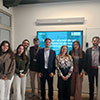 22.04.2025
22.04.2025 As part of Manuel Rodríguez’s subject, Lobbying and Mobilization Campaigns, students from the Master’s in Political Communication and Crisis and Emergency Management welcomed a guest lecture from Alejandro Labanda, Director of Ecological Transition at beBartlet. Alejandro provided students with a unique insight into the day-to-day work of a public affairs professional, highlighting how political advocacy campaigns and public dialogue can play a transformative role in shaping our environment.
 09.04.2025
09.04.2025 As part of Alberto Pérez’s course, Spokespersonship and Public Discourse, students in the Master’s in Political Communication and Crisis and Emergency Management had the opportunity to meet with Miguel Ángel Sastre Uyá, national representative of the Partido Popular (PP) group. During the session, led by Representative Sastre, students explored key topics such as the preparation of political speeches, effective communication strategies in politics, the use of rhetorical devices, message development, the contexts in which communication occurs, and how to engage with younger audiences.
 25.03.2025
25.03.2025 Master’s students, accompanied by the program director and several professors, attended the Beers & Politics event at Hostel Bastardo in Madrid. This gathering brought together speakers, debaters, and learners, all united by a shared interest in political communication. The keynote speaker for this session was Valeria Racu, a spokesperson for the tenants' union, an organization founded in 2017. In Madrid, the event is organized by Manuel Rodríguez, a political scientist and professor in the Master’s program, alongside others.
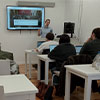 19.02.2025
19.02.2025 Political consultant Franz Von Bergen met with Master’s students to explore the significance of conventional media versus social media. According to Von Bergen, the key lies in effectively engaging the media so they understand, interpret, and amplify the ideas that companies aim to communicate to their target audiences. He emphasized the need for creativity, persistence, and professionalism, noting that media outlets face limited space and an overwhelming influx of information. To stand out, messages must be distinctive and impactful.
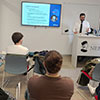 17.02.2025
17.02.2025 On Monday, February 17, students from the Master's Degree in Political Communication and Crisis and Emergency Management had the privilege of attending a special session with Carlos Pérez Padilla, an official from the Directorate-General for Communication at the European Union. The discussion focused on the significance of citizen participation in public policy deliberation within the Union. We extend our gratitude to Manuel Rodríguez, professor of the program, for facilitating this event at the Faculty of Communication and Arts. Active citizen engagement not only encourages the exchange of ideas but also strengthens collective identity—especially at a time when the European Union faces key challenges. By integrating diverse voices into the decision-making process, these initiatives bring Europeans closer to shaping solutions for the present and future of the continent. The workshop and classroom discussion demonstrated the students' dedication to developing innovative proposals and ideas. In alignment with these efforts, the European Commission is launching a digital platform to encourage contributions from all residents of Europe, allowing them to share ideas and plans for the Union's future.
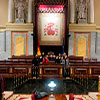 10.02.2025
10.02.2025 As part of Carmen Torres's course, "Disinformation and Electoral Campaigns: Microsegmentation in Social Media and Fake News", Master's students had the opportunity to visit the Congress of Deputies. During the visit, they explored both the traditional spaces, including the Chamber and its adjoining rooms, as well as the modern area where journalists conduct their daily work and parliamentary appearances take place. The students were guided throughout the tour by Verónica Martínez, spokesperson for the SUMAR Parliamentary Group; Victoria Sánchez, Chief of Staff of the SUMAR Parliamentary Group in Congress; and the communications team.
 27.01.2025
27.01.2025 Master's students, accompanied by the program director and several professors, attended the event called Beers & Politics at Hostel Bastardo in Madrid. This event is a forum for discussion, debate, and learning centered around a guest speaker specializing in political communication. The featured guest was Patricia Horrillo, an expert in communication and social networks, and an editor of Wikipedia. The event focused on the significance of Wikipedia as a platform for creating collective knowledge and the ongoing conflict with Elon Musk, who has accused the platform of favoring woke interests. In Madrid, this meeting is organized by Manuel Rodríguez, a political scientist and professor in the Master's program, among others.
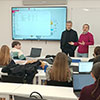 23.01.2025
23.01.2025 The students of the Master's Degree in Political Communication and Crisis and Emergency Management had the privilege of a visit from José Manuel López, Chief of Staff of the Minister of Health, Mónica García, as part of Sergio Pascual's course. José Manuel López shared key insights into the development of political and institutional campaigns. The students benefited from the practical and daily experience of a senior representative of a current Ministry of the Government of Spain.
 08.01.2025
08.01.2025 The consultant and expert in digital communication, Javier Pereira, visited the students of the in-person Master's degree program to discuss the relevance of social networks in political communication. During this class, he addressed important topics such as audience segmentation, the different ways of communicating based on the social network, and the latest trends in digital communication.
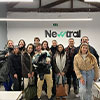 11.12.2024
11.12.2024 We spent some time at the Newtral editorial office with part of its team, led by journalist Irene Larranz. They shared insights into their daily work, from verifying information to avoid hoaxes, to fact-checking political discourse, regulatory monitoring, and audiovisual production. We also met with one of the people responsible for Newtral's documentary program, "Gabinete de Crisis" (Crisis Cabinet) which is broadcast on La Sexta.
 11.12.2024
11.12.2024 The students of the Master's Degree in Political Communication were fortunate to have Valvanuz Serna, co-founder of the Proa Comunicación agency, in the classroom. Valvanuz is a specialist in corporate communication, particularly in the mass consumption and professional services sectors. She emphasized the importance of preparing crisis communication plans and the central role that action protocols and spokesperson preparation play in highly mediatized societies.
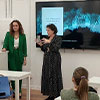 9.12.2024
9.12.2024 One of the deputy spokespersons for the Popular Party group in the Congress of Deputies, Pedro Muñoz Abrines, participated in an interview conducted by students of the Master's Degree program. The objective of this exercise, developed in the classrooms of the School of Communication and Arts, was to examine how messages are articulated around a specific idea, the mediatization and spectacularization of politics, and the analysis of the driving ideas in each response.
 3.12.2024
3.12.2024 The students who stayed in Madrid visited the Real Casa de Correos, the headquarters of the presidency of the Community of Madrid, to witness the event commemorating the anniversary of the Spanish Constitution. There, they met the regional president, Isabel Díaz Ayuso, and shared a few minutes with her. This activity was of great importance as the students gained an understanding of the media's role in such events, aiming to convey a message of stability, coherence, and respect for the Magna Carta to society.
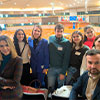 2.12.2024
2.12.2024 Brussels, the capital of European politics, became a classroom for our students of the Master's Degree in Political Communication and Crisis and Emergency Management. A significant part of the master's students and some teachers traveled to Brussels to learn about the main institutions of the European Union and explore professional opportunities within these institutions. These were fantastic days, filled with experiences, learning, and many memories. There is nothing better than enjoying these moments with the master's students, both current and graduates. Particularly noteworthy was the conversation with Borja Lasheras, who until the previous day had been Josep Borrell's policy coordinator and special advisor for Ukraine, and the visit to the European Parliament, where we had the immense good fortune to speak with the socialist MEP Iratxe García, current president of the Progressive Alliance of Socialists and Democrats in the European Parliament.
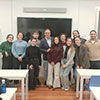 27.11.2024
27.11.2024 On November 27, students of the Master's Degree in Political Communication and Crisis and Emergency Management at Nebrija University had the privilege of hosting Senator Alfonso Serrano. As part of Professor Carmen Carmona's course, "Design and Planning of Institutional Communication Campaigns II: Strategic Plan and Evaluation," Senator Serrano shared his insights on electoral campaigns, the creation of political narratives that resonate with diverse social groups, and the significance of framing.
Leer +
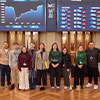 27.11.2024
27.11.2024 Students of the Master's in Political Communication and Crisis and Emergency Management, led by Professor Diana Cortecero, visited the Madrid Stock Exchange to discuss crisis communication management in the financial sector. Esther Tribaldos, deputy director of corporate communication at the BME Group, shared insights into the history and curiosities of the stock market, and detailed the daily operations of the company's communications department. Professor Cortecero also took the opportunity to explain a notable business crisis that occurred in the building following the stock market debut of a Spanish company a few years ago.
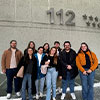 25.11.2024
25.11.2024 We visited the 112 Emergency Centre of the Community of Madrid, which manages over 3,500 emergency reports daily, ranging from house fires and traffic accidents to homicides, road disturbances, forest fires, assaults, and brawls. In its state-of-the-art facilities, which are pioneers at both national and international levels, 250 people work in shifts each day. They are dedicated to optimizing emergency management to ensure a quick and effective response to citizens' problems.
 25.11.2024
25.11.2024 Our students from the Master's in Political Communication and Crisis and Emergency Management at Nebrija University showcase their ability and creativity in analyzing and producing political content. Within the framework of the course "Data Analysis for Political Communication: Propaganda, Political Marketing, Mediatization, and Cyberpolitics," directed by Professor Tania Brandariz, our students had the opportunity to apply their acquired knowledge in a highly relevant and stimulating practical exercise. Through the creation of a political podcast, students have been able to put into practice their analytical, writing, and communication skills—key competences for political communication professionals.
 25.11.2024
25.11.2024 Our students of the Master's Degree in Political Communication and Crisis and Emergency Management at Nebrija University had the pleasure of hosting Juan Matías Fernández Bustos. He holds a degree in International Relations from the Universidad del Salvador in Buenos Aires, Argentina, where he also served as an adjunct professor of Comparative Latin American Political Systems. Previously, he was a Senior Specialist in Government Outreach at Edelman Global Advisory, part of the regional Public Affairs HUB for LATAM, handling accounts in the technology, financial, mass consumption, and industrial sectors, specializing in research, strategic planning, and engagement. For the past three years, he has worked as a Senior Public Affairs Consultant, having been with Political Intelligence and currently based at LLYC.
 21.11.2024
21.11.2024 Students of the Master's in Political Communication and Crisis and Emergency Management at Nebrija University recently faced an extreme communication simulation: an interview on the management of DANA. We are committed to preparing the spokespersons of the future.
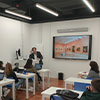 20.11.2024
20.11.2024 José María Goicoechea, director of communications at the Thyssen-Bornemisza National Museum, attended Professor Diana Cortecero's class to explain to students that culture can also be a scene of crisis, not only sectors like energy or food which are often seen as more vulnerable. Ultimately, the actions taken are similar, and the objective remains the same: to strengthen the reputation so that a crisis becomes an opportunity to consolidate the brand.
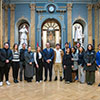 14.11.2024
14.11.2024 Students had the opportunity to meet with Pedro Rollán, the President of the Senate, who provided an overview of the composition and functioning of the chamber. He also answered their questions on various political, social, and media issues related to the Senate's activities. Additionally, the students enjoyed a guided tour of the Senate, learning about the building's history and some of the artistic treasures it houses. A heartfelt thank you to Pedro Rollán and his team for their attention and warmth.
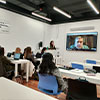 13.11.2024
13.11.2024 The students had the opportunity to virtually engage with Xosé Manuel Pereiro, the vice-dean of the Professional College of Journalists of Galicia, TVE delegate, and correspondent for El País during the Prestige crisis. He is also the coordinator of the book Chapapote (Libros del KO) and the author of Prestige, tal como foi, tal como fomos (Galaxia). We discussed how communication was managed during the shipwreck crisis and the post-crisis period, touching on topics such as misinformation, the importance of selecting technical spokespersons instead of political ones for certain issues, and the significant turning point it represented in terms of social protest against the institutional response.
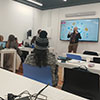 13.11.2024
13.11.2024 The students had the pleasure of hosting David del Cura, currently the Coordinator of the Presidency of the Spanish Banking Association. A seasoned journalist, he previously served as the press chief for Vice President Soraya Sáenz de Santamaría and directed and presented La Brújula on Onda Cero. He was also responsible for Nacional, the weekend news, and the news segments for programs by Luis del Olmo and Carlos Herrera.
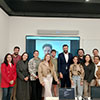 31.10.2024
31.10.2024The Master's in Political Communication and Crisis and Emergency Management at Nebrija University had the privilege of hosting Carlos Díaz-Pache, Spokesperson for the Popular Party (Partido Popular) in the Madrid Assembly. Together with his chief of staff, Marta Cid, they shared their experiences on the role of a spokesperson and the dynamics of teamwork. We appreciate their generosity and the valuable exchange with our students, which reinforces the master's degree's commitment to bringing politics closer to the academic field.
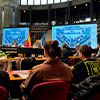 23.10.2024
23.10.2024The Master's students attended the III Emergency Communication Seminar organized by the General Directorate of Civil Protection of the Ministry of Internal Affairs, along with the APM and the EFE agency. Over three intense days of panels and conferences, the students delved deeper into the civil protection system, emergency plans, the roles of firefighters, health workers, and the State's security forces. The seminar addressed the need for specific training for journalists in emergency and catastrophe plans, emphasizing their role in communicating reliable, truthful, and verified information to citizens. Additionally, the importance of agility from official sources in providing this information to the media and citizens through social networks was discussed.
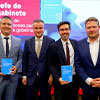 22.10.2024
22.10.2024 On October 22, we had the honor of celebrating the official presentation of the new cohort of the Master's Degree in Political Communication and Crisis and Emergency Management at Nebrija University. The event was highlighted by the presentation of the book "Jefe de Gabinete" by Toni Aira and Sergi Sabaté, with prominent professionals such as Iván Redondo in attendance. The panel was moderated by Óscar Álvarez, president of ACOP. The students of this new cohort enjoyed an unparalleled political event that provided insights into the role of the chief of staff. Leer menos
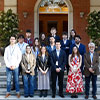 17.04.2024
17.04.2024In mid-April, a group of Master's students had the opportunity to explore the Moncloa Palace complex. Guided by Manuel López, one of their professors who works in the speech preparation department for the President of the Government, the students delved into the rich history of the various buildings. They also visited significant areas such as the press room, where the media is briefed after Council of Ministers sessions.
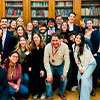 03.04.2024
03.04.2024Within the scope of their course "Disinformation and Electoral Campaigns: Microsegmentation in Social Media and Fake News," the Master's students have initiated the inaugural edition of COMPOL Verifrija: Europe Edition. This groundbreaking initiative marks the first university Escape Room designed to combat disinformation within the context of European elections. Participants have been divided into multiple groups, encompassing not only students from the current academic year but also involving family members, friends, professors, and students from previous cohorts. The event unfolds across three distinct scenarios, each aimed at combating misinformation through rigorous research and the critical examination of sources and information.
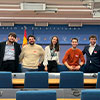 15.03.2024
15.03.2024Professor Daniel Ayllón, the Director of Communication (DIRCOM) at the Ministry of Youth and Children of the Government of Spain, graciously accompanied us during our visit to the Congress of Deputies. We explored both the traditional areas, including the Hemicycle and surrounding rooms, and the new area where journalists conduct their daily work and parliamentary appearances occur.
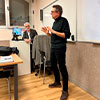 11.03.2024
11.03.2024We also wanted to commemorate and pay tribute on the occasion of the 20th anniversary of the attacks that occurred in Madrid on March 11, 2024. In our classrooms, we had the privilege of hosting Rodolfo Irago, the journalist from the SER chain, who shared with us the experiences from the newsroom during those moments and the events that unfolded until the elections just three days later.
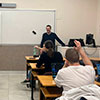 08.02.2024
08.02.2024The political consultant Franz Von Bergen recently engaged with Master's students to discuss the significance of conventional media in contrast to social networks. According to Von Bergen, the key is to understand how to captivate the attention of the media, ensuring they grasp, internalize, and serve as a conduit for the ideas companies aim to communicate to their target audience. To achieve this, creativity, persistence, and professionalism are paramount, given the limited space and abundance of information within the media landscape. It is essential to craft a distinctive message that stands out amidst the noise.
 31.01.2024
31.01.2024Political scientist Alicia Peñaranda recently virtually joined our classrooms to deliver a talk to students enrolled in the online mode of the Master's degree in Political Communication and Crisis and Emergency Management. The session was engaging and informative, as Peñaranda, a Colombian national, shared insights into effective institutional communication strategies rooted in local institutions that maintain direct contact with citizens.
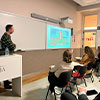 26.01.2024
26.01.2024The press officer of Madrid's Gregorio Marañón Hospital, David García, from one of the leading hospitals nationally and internationally, recently visited our classroom. He addressed students on the significance of both external and internal communication. Engaging in insightful discussions, he explored the organization of communication concerning patients facing challenging situations in the hospital. García acknowledged the pivotal role played by healthcare workers, emphasizing the transformative impact of the COVID-19 pandemic, which brought public recognition to the essential daily services provided by healthcare professionals.
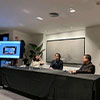 17.01.2024
17.01.2024A meeting was held at the Harmon consulting firm, accompanied by Professor Diana Cortecero, who is also associated with the company, alongside Manuel de la Fuente, partner in Public Affairs, and Francisco Calderón, partner in Corporate Affairs. The discussion centered around concepts such as the "non-market," which is integral to the firm's methodology. Harmon defines the "non-market" realm as encompassing "all aspects of a company or organization directly related to creating optimal conditions—economic, social, regulatory, reputational, environmental, and even emotional—that contribute to improved performance and, ultimately, the achievement of business objectives."
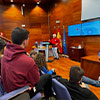 09.01.2024
09.01.2024Our visit took us to the 112 Emergency Center of the Community of Madrid, where over 3,500 emergency cases are managed daily. These cases encompass a wide range of situations, from house fires and traffic accidents to homicides, road closures, forest fires, assaults, and altercations. This pioneering facility, both nationally and internationally, employs 250 individuals who work in shifts to optimize emergency response and ensure swift and effective assistance to citizens in times of need.
 20.12.2023
20.12.2023We spent some time in the Newtral newsroom, meeting with a portion of its team, led by journalist Irene Larranz. They shared insights into their daily operations, ranging from information verification to combatting misinformation, fact-checking political discourse, regulatory monitoring, and audiovisual production. Additionally, we had the opportunity to engage with one of the individuals responsible for Newtral's documentary program, Gabinete de Crisis, which airs on La Sexta.
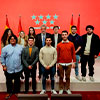 19-12-2023
19-12-2023The Chief of Staff of Isabel Díaz Ayuso, President of the Community of Madrid, Miguel Ángel Rodríguez, recently met with Master's students to discuss current political events and the strategies employed by politicians to shape their public image. According to Rodríguez, while the idea is crucial, effective storytelling is equally vital. The meeting was held at the headquarters of the Presidency, located in the Real Casa de Correos in Puerta del Sol.
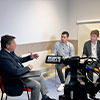 18-12-2023
18-12-2023Pedro Muñoz Abrines, one of the deputy spokespersons for the PP in the Congress of Deputies, graciously agreed to participate in an interview conducted by the Master's students. The purpose of this exercise, held within the classrooms of the School of Communication and Arts, is to examine how messages are crafted around a particular idea, the role of media in shaping political narratives and creating spectacle, and the analysis of significant concepts within each response.
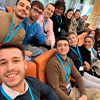 14-12-2023
14-12-2023We attended a plenary session of the Madrid Assembly, situated in the Puente de Vallecas district. Here, students had the opportunity to admire the Assembly's architecture, characterized by an open-plan design with expansive windows symbolizing its accessibility to citizens. Moreover, they witnessed the spirited debates between the President of the Community, Isabel Díaz Ayuso, and the spokespersons of various opposition parliamentary groups.
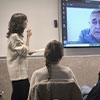 13-12-2023
13-12-2023Students had the privilege of virtually engaging with Xosé Manuel Pereiro, Vice-Dean of the Professional Association of Journalists of Galicia, TVE delegate, and correspondent for El País during the Prestige crisis. He is also the coordinator of the book "Chapapote" (Libros del KO) and the author of "Prestige, tal como foi, tal como fomos" (Galaxia). Our discussions have centered around communication management both during the crisis caused by the shipwreck and in the aftermath. Additionally, we have explored topics such as disinformation, the significance of opting for technical spokespersons rather than political ones for specific issues, and the pivotal role this played in shaping societal responses to institutional actions.
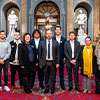 04-12-2023
04-12-2023Meeting with the President of the Senate, Pedro Rollán, who, after comprehensively explaining the chamber's composition and operations, engaged with the students, addressing their inquiries on various compelling topics related to the political, social, and media significance of Senate affairs. Furthermore, the students enjoyed a guided tour of the Senate offices, gaining insights into the building's history and admiring some of its artistic treasures. Sincere gratitude is extended to Pedro Rollán and his team for their attentive assistance and hospitality.
 04-12-2023
04-12-2023Students visited the Real Casa de Correos, the seat of the presidency of the Community of Madrid, to observe the event commemorating the anniversary of the Spanish Constitution. During their visit, they had the privilege of meeting with the regional president, Isabel Díaz Ayuso, for a brief exchange. This experience was particularly enlightening as it underscored the significant role of the media in such events, aiming to communicate messages of stability, coherence, and respect for the Magna Carta to society.
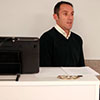 29-11-2023
29-11-2023During Diana Cortecero's class, Eduardo Córdoba Vallet, former press officer of the Ministry of Foreign Affairs (2018-2021) and currently a reporter for the International section at Mediaset España, delivered a lecture. Córdoba elaborated on the intricacies of media dynamics vis-à-vis politicians, shedding light on the codes governing their interaction. Moreover, he delved into the nuances of crisis prediction and post-crisis management within the realm of politics, offering invaluable insights to the students enrolled in the Master's in Political Communication program.
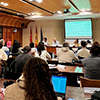 24-11-2023
24-11-2023Throughout the week, Master's students had the valuable opportunity to participate in the II Emergency Communication Seminar, organized by the General Directorate of Civil Protection of the Ministry of Internal Affairs. The sessions were conducted in-person at multiple locations, including the Rivas Vaciamadrid National School, the DGPCE headquarters, and the Madrid Press Association, where the Seminar concluded. Esteemed speakers shared insights into specific cases such as Storm Filomena, DANA, and the La Palma volcano. Emergency information managers from entities like the National Police, Civil Guard, UME, and 112 of the Community of Madrid also delivered impactful interventions.
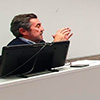 22-11-2023
22-11-2023José María Goicoechea, the communications director of the Thyssen-Bornemisza National Museum, joined Professor Diana Cortecero's class to highlight that culture, like other sectors such as energy or food, can also be susceptible to crises. He emphasized the parallel actions and objectives: leveraging crises as opportunities to fortify reputation and solidify the brand's position.
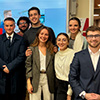 22-11-2023
22-11-2023In the classrooms of Nebrija's School of Communication and Arts, we welcomed political consultant Iván Redondo, former Chief of Staff to President Pedro Sánchez, alongside Miguel Ángel Oliver, a journalist presently at Mediaset and Secretary of State for Communication. In their engaging session with students, Redondo offered insights into the new government formed by Sánchez that same week, describing it as committed to addressing the demands of the current times, emphasizing the need for heightened listening and articulating the implications of the government pact with Catalan and Basque nationalists. Oliver stressed the importance of a normal, measured political process, advocating against sensationalism or demagoguery, prioritizing the collective will of the Spanish people over transient political interests.
 20-11-2023
20-11-2023The Master's students, along with the director and coordinator, visited Hostel Bastardo in Madrid for the Beers & Politics event—a forum for discussions, debates, and learning centered around political communication. The session featured journalist Javier Ruiz, head of the Economy Area at Cadena SER, who delved not only into economics but also economic policy. Ruiz emphasized crucial political areas like fiscal policies and, notably, the allocation of tax revenues. Manuel Rodríguez, a political scientist and a Master's program professor, is among the organizers of this engaging event held in Madrid.
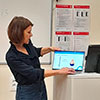 16-11-023
16-11-023Greet Gysen, Head of Communication and Information at the European Data Protection Committee, addressed institutional crisis communication during the Master’s session. Among various topics, she delved into the sensitive issue of private data usage by major tech companies, citing Meta's recent fine due to its questionable practices.
 15-11-2023
15-11-2023Students of the Master's Degree in Political Communication and Crisis and Emergency Management, under the guidance of Professor Diana Cortecero, had an insightful visit to the Madrid Stock Exchange Palace focused on crisis communication management within the financial sector. Esther Tribaldos, deputy director of corporate communications at the BME Group, provided an overview of the trading floor's history, shared intriguing insights, and described the daily operations within the company's communications department. During the session, Professor Cortecero also elaborated on a significant business crisis that unfolded in the building following the stock market debut of a Spanish company some years back.
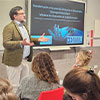 15-11-2023
15-11-2023The visit from Rafael Rubio, professor at the UCM, shed light on combating disinformation effectively. He stressed the need for long-term strategic institutional communication, emphasizing the importance of building reputation and establishing distribution networks to amplify responses. Rubio highlighted various objectives behind disinformation campaigns, including influencing electoral outcomes, creating uncertainty about poll legitimacy, and serving economic interests, as disinformation has spurred an industry involving both countries and private companies.
 13-11-2023
13-11-2023Tania Brandariz, Coordinator of the Master's degree, traveled to Barcelona for a meeting hosted by the Konrad Adenauer Foundation. The focus was on debating and discussing the contemporary significance of political communication in bridging the gap between politics and the broader public. This included engaging the youth, who will become future voters, and the elderly, who hold distinct perspectives on global policies. The dialogue proved highly productive, yielding valuable insights and conclusions for future endeavors in this realm.
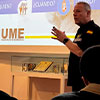 30-10-2023
30-10-2023On the afternoon of October 30, students enrolled in the Master's Degree had a firsthand experience touring the facilities of BIEM I at the Torrejón de Ardoz air base, belonging to the Military Emergency Unit (UME). Welcomed by Colonel Miguel A. Martínez Ávila, Director of Institutional Relations, and Commander Aurelio Soto, Head of Public Communication, the students explored the hangar, examining the vehicles utilized by the UME's first response team and gaining insight into the communication equipment used by the unit. This visit offered students a profound understanding of the UME's critical role in orchestrating emergency operations at the national level. The UME's primary mission involves serving citizens and supporting local and regional emergency response teams, both within Spain and on international missions.
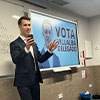 23-10-2023
23-10-2023During the elections for the delegate position in the Master's Degree in Political Communication and Crisis and Emergency Management, four candidates vied for the role. They presented proposals, delineated their agendas, and fervently showcased their ability to engage in argumentative discourse, all in pursuit of securing the coveted delegate position. Ultimately, Gonzalo Rodríguez emerged victorious as the delegate, while Jaime Villalba secured 9 votes, earning the position of deputy delegate.
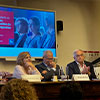 16-10-2023
16-10-2023In the inaugural session of the Master's Degree in Political Communication and Crisis and Emergency Management at Nebrija University's School of Communication and Arts, Elena Valenciano, former PSOE Deputy General Secretary (2012-2014), and Esteban González Pons, Deputy Secretary of Institutional and International Affairs for the Popular Party, aligned closely in their messages. The debate, which centered on the intricacies and overlaps of communication and politics, was moderated by Gregorio Martínez, Director of Institutional Relations at the University. The event, attended by forty students participating in the second edition of the postgraduate program, explored the nuanced interplay between communication, politics, and their complexities.
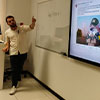 10-10-2023
10-10-2023Iago Moreno, a professor teaching in the Online modality, delivered a conference to students enrolled in the face-to-face modality. His session delved into the future landscape of political communication within the digital sphere. Moreno extensively covered topics such as mediatization in politics, the impact of social networks, fake news, memes, and the metaverse.
 09-10-2023
09-10-2023Manuel de la Fuente, partner at Harmon Consulting firm, graced the official opening ceremony of the Master's Degrees of the School of Communication and Arts at Nebrija University. Notably, these degrees include the Master's in Political Communication and Crisis and Emergency Management. During the event, he emphasized the critical significance of top-tier education, spotlighting the pivotal role consulting firms fulfill in today's landscape. De la Fuente emphasized the indispensable nature of adeptly wielding political communication tools to reach citizens effectively—clearly, accurately, and without any distortion that could impair the intended message.
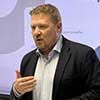 The president of the Political Communication Association (ACOP), Óscar Álvarez, inaugurated in November 2022, the 1st Edition of the Master's Degree in Political Communication and Crisis and Emergency Management. Álvarez highlighted the importance of the political consultant's profession in order to effectively meet the objectives of a public and private organization.
The president of the Political Communication Association (ACOP), Óscar Álvarez, inaugurated in November 2022, the 1st Edition of the Master's Degree in Political Communication and Crisis and Emergency Management. Álvarez highlighted the importance of the political consultant's profession in order to effectively meet the objectives of a public and private organization.
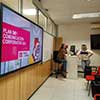 Patricia Leiva, Director of Institutional Relations, Communication and Corporate Social Responsibility at Mahou-San Miguel, explained to the students the relevance of planning as the basis for success in communication. It is essential to reach the target audience, and reach it through internal and external communication.
Patricia Leiva, Director of Institutional Relations, Communication and Corporate Social Responsibility at Mahou-San Miguel, explained to the students the relevance of planning as the basis for success in communication. It is essential to reach the target audience, and reach it through internal and external communication.
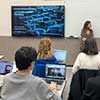 Andrea Martínez and Alberto Bonilla, recounted their experience as parliamentarians in the classroom of the Master's Degree in Political Communication and Crisis and Emergency Management. It is key to adopt in political organizations the perspective of a private company in the organization and approach to communication.
Andrea Martínez and Alberto Bonilla, recounted their experience as parliamentarians in the classroom of the Master's Degree in Political Communication and Crisis and Emergency Management. It is key to adopt in political organizations the perspective of a private company in the organization and approach to communication.
 In November 2022, the students had the first of the outings outside the classroom. Specifically to the Beers&Politics that was held at the Bastardo Hostel in Madrid. There, and by the hand of one of the Master's professors, Manuel Rodríguez, they listened to the reflections of María Llorach, PSOE's press officer in the Madrid city council, and Daniel Bardavío, press officer for the mayor of the capital, Partido Popular's Martinez Almeida.
In November 2022, the students had the first of the outings outside the classroom. Specifically to the Beers&Politics that was held at the Bastardo Hostel in Madrid. There, and by the hand of one of the Master's professors, Manuel Rodríguez, they listened to the reflections of María Llorach, PSOE's press officer in the Madrid city council, and Daniel Bardavío, press officer for the mayor of the capital, Partido Popular's Martinez Almeida.
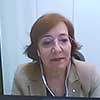 The former Secretary of State for Communication during the government of Mariano Rajoy, Carmen Martínez Castro, participated virtually in the class of another former Secretary of State for Communication and professor of the Master's degree, Miguel Ángel Oliver. They spoke, in an interview format, about the difficulties of coordinating teams and planning a coherent and responsible communication policy.
The former Secretary of State for Communication during the government of Mariano Rajoy, Carmen Martínez Castro, participated virtually in the class of another former Secretary of State for Communication and professor of the Master's degree, Miguel Ángel Oliver. They spoke, in an interview format, about the difficulties of coordinating teams and planning a coherent and responsible communication policy.
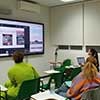 Alberto Senante, a journalist specializing in NGOs and the Third Sector, spoke in the class of the current press officer of Minister Garzón, Professor Ana Vázquez Toscano, to explain the relevance of communication in organizations that seek to influence politicians and legislate with guarantees of equity and balance for the most disadvantaged.
Alberto Senante, a journalist specializing in NGOs and the Third Sector, spoke in the class of the current press officer of Minister Garzón, Professor Ana Vázquez Toscano, to explain the relevance of communication in organizations that seek to influence politicians and legislate with guarantees of equity and balance for the most disadvantaged.
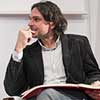 On November 25, 2022, the first Political Friday was held, attended by students from the Master's degree and also from other postgraduates from the School of Communication and Arts of Nebrija University, which focused on social networks and political communication, with the presence of Javier Pereira, Delia Rodríguez, and Adrián González.
On November 25, 2022, the first Political Friday was held, attended by students from the Master's degree and also from other postgraduates from the School of Communication and Arts of Nebrija University, which focused on social networks and political communication, with the presence of Javier Pereira, Delia Rodríguez, and Adrián González.
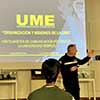 At the end of November 2022, the students visited the BIEM I facilities of the Military Emergency Unit (UME) in Torrejón de Ardoz. Guided by the UME press officer, Aurelio Soto, they visited its facilities and learned about the important work carried out by the military on missions in Spain and beyond our borders.
At the end of November 2022, the students visited the BIEM I facilities of the Military Emergency Unit (UME) in Torrejón de Ardoz. Guided by the UME press officer, Aurelio Soto, they visited its facilities and learned about the important work carried out by the military on missions in Spain and beyond our borders.
 Nieves Goicoechea spoke virtually to the students about her experience at the Secretary of State for Communication, stressing the work they carried out during the COVID 19 pandemic, which pushed the communication structures of La Moncloa to the limit, to respond to the daily challenges.
Nieves Goicoechea spoke virtually to the students about her experience at the Secretary of State for Communication, stressing the work they carried out during the COVID 19 pandemic, which pushed the communication structures of La Moncloa to the limit, to respond to the daily challenges.
 In December, students had the opportunity to conduct an interview with the spokesperson for the Popular group in the Madrid Assembly, Pedro Muñoz Abrines, who answered questions from the students in the TV studio of the School of Communication and Arts at Nebrija University.
In December, students had the opportunity to conduct an interview with the spokesperson for the Popular group in the Madrid Assembly, Pedro Muñoz Abrines, who answered questions from the students in the TV studio of the School of Communication and Arts at Nebrija University.
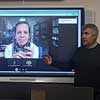 Susana Reverter, current press officer at Hospital La Paz, held a dialogue with the students in which she highlighted the importance of internal communication and the need for citizens to learn first-hand about the work carried out by the research groups of one of the most prestigious hospitals in all of Spain.
Susana Reverter, current press officer at Hospital La Paz, held a dialogue with the students in which she highlighted the importance of internal communication and the need for citizens to learn first-hand about the work carried out by the research groups of one of the most prestigious hospitals in all of Spain.
 Fabio Benítez, cabinet director in the town hall of Arico (Tenerife) explained to the students, within the framework of the subject taught by Professor Tania Brandariz, the importance of local politics and how they achieve a presence in the media with a strategy based on in closeness, empathy, and mutual knowledge.
Fabio Benítez, cabinet director in the town hall of Arico (Tenerife) explained to the students, within the framework of the subject taught by Professor Tania Brandariz, the importance of local politics and how they achieve a presence in the media with a strategy based on in closeness, empathy, and mutual knowledge.
 On December 22, 2022, students of the Master's Degree in Political Communication and Crisis and Emergency Management visited the House of Representatives, accompanied by Professor Ana Vázquez Toscano. The students were at all times attentive to the explanations of the person in charge of Events and Protocol of the House, who told them about the history, past, present and future of the Institution.
On December 22, 2022, students of the Master's Degree in Political Communication and Crisis and Emergency Management visited the House of Representatives, accompanied by Professor Ana Vázquez Toscano. The students were at all times attentive to the explanations of the person in charge of Events and Protocol of the House, who told them about the history, past, present and future of the Institution.
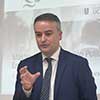 Iván Redondo, former chief of staff of President Pedro Sánchez, wanted to share his knowledge and theories about the relevance of the profession of political consultant with the students in the classroom. He stressed that the consultant must listen, appeal to feelings and direct the leader to meet the objectives. And, if need be, he should tell him/her of his/her shortcomings and the way to overcome them.
Iván Redondo, former chief of staff of President Pedro Sánchez, wanted to share his knowledge and theories about the relevance of the profession of political consultant with the students in the classroom. He stressed that the consultant must listen, appeal to feelings and direct the leader to meet the objectives. And, if need be, he should tell him/her of his/her shortcomings and the way to overcome them.
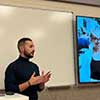 In the class of Professor Elsa Tadea García, Vicente Rodrigo, from ING, explained to the students the importance of a good communication manager, especially from the point of view of corporate communication, and how all the departments of a company must work together in order to meet its objectives.
In the class of Professor Elsa Tadea García, Vicente Rodrigo, from ING, explained to the students the importance of a good communication manager, especially from the point of view of corporate communication, and how all the departments of a company must work together in order to meet its objectives.
 Professor Ana Vázquez Toscano and journalist Ángeles Cabalero, from El Confidencial, carried out real spokesperson practices with the students in the TV studio of the University's School of Communication and Arts. They looked after not only to the substance of the arguments used, but also to the way they were communicated.
Professor Ana Vázquez Toscano and journalist Ángeles Cabalero, from El Confidencial, carried out real spokesperson practices with the students in the TV studio of the University's School of Communication and Arts. They looked after not only to the substance of the arguments used, but also to the way they were communicated.
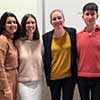 Elena de Pedro, a consultant at Harmon, one of the companies that collaborate with the Master's Degree in Political Communication and Crisis and Emergency Management, revealed in the classroom what the daily work of a consultant is, and to what extent it is important to meet the needs of clients and the public, within the framework of what they call the non-market.
Elena de Pedro, a consultant at Harmon, one of the companies that collaborate with the Master's Degree in Political Communication and Crisis and Emergency Management, revealed in the classroom what the daily work of a consultant is, and to what extent it is important to meet the needs of clients and the public, within the framework of what they call the non-market.
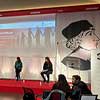 On February 17, 2023, the second edition of Political Fridays took place, this time focused on the Third Sector. Julia García, from OXFAM-Intermón, and Alejandra Agudo, from Reporters Without Borders (RSF) took part in the event, with Professor Manuel Rodríguez as moderator of the meeting.
On February 17, 2023, the second edition of Political Fridays took place, this time focused on the Third Sector. Julia García, from OXFAM-Intermón, and Alejandra Agudo, from Reporters Without Borders (RSF) took part in the event, with Professor Manuel Rodríguez as moderator of the meeting.
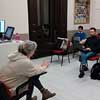 Ana María González Oxford, director of the NGO Reto, and communication consultant, participated in Professor Eglée Ortega's class. She spoke about the command structure in a political campaign and the relevance of the strategy in the world of communication.
Ana María González Oxford, director of the NGO Reto, and communication consultant, participated in Professor Eglée Ortega's class. She spoke about the command structure in a political campaign and the relevance of the strategy in the world of communication.
 Accompanied by the Master's teacher Nuria Bravo, the students visited the facilities of the Royal Spanish Football Federation (RFEF) where they spoke with the current national football coach, Luis de la Fuente, and visited the RFEF museum and the trophies won by the different categories of the Spanish teams.
Accompanied by the Master's teacher Nuria Bravo, the students visited the facilities of the Royal Spanish Football Federation (RFEF) where they spoke with the current national football coach, Luis de la Fuente, and visited the RFEF museum and the trophies won by the different categories of the Spanish teams.
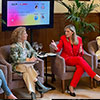 On March 7, 2023, one day before the commemoration of Women's Day, the Master's students attended the Ateneo de Madrid for a talk organized by FEDEPE: Women leaders in politics, with the participation of Carmen Calvo, Rocío Monasterio, Ana Pastor and Rocío Guasp.
On March 7, 2023, one day before the commemoration of Women's Day, the Master's students attended the Ateneo de Madrid for a talk organized by FEDEPE: Women leaders in politics, with the participation of Carmen Calvo, Rocío Monasterio, Ana Pastor and Rocío Guasp.
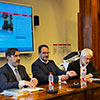 José Luis Ayllón, head of Mariano Rajoy's Cabinet, and Antonio Hernando, current number two in Moncloa's Cabinet for President Sánchez, spoke about political communication, its mistakes and its successes, the characteristics of the post of chief of staff and its implications, in a talk moderated by the Master's professor, Manuel López.
José Luis Ayllón, head of Mariano Rajoy's Cabinet, and Antonio Hernando, current number two in Moncloa's Cabinet for President Sánchez, spoke about political communication, its mistakes and its successes, the characteristics of the post of chief of staff and its implications, in a talk moderated by the Master's professor, Manuel López.
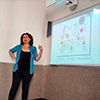 Professor Manuel Rodríguez invites Anxela Iglesias, coordinator of communication campaigns and digital strategies at Komons, to the classroom to prepare a research workshop on narratives in the media.
Professor Manuel Rodríguez invites Anxela Iglesias, coordinator of communication campaigns and digital strategies at Komons, to the classroom to prepare a research workshop on narratives in the media.
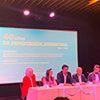 Several professors of the Master's Degree in of Political Communication and Crisis and Emergency Management of Nebrija University's School of Communication and Arts, took part in the presentation of an Open Chair promoted by the Argentine government to commemorate 40 years of democracy in the South American country. The objective of the chair is to reflect on globalization, digital citizenship, climate change, the displacement of power and artificial intelligence. The Master's coordinator, Tania Brandariz, and professors Juan Ignacio Estévez and Gonzalo Sarasqueta participated on behalf of Nebrija University.
Several professors of the Master's Degree in of Political Communication and Crisis and Emergency Management of Nebrija University's School of Communication and Arts, took part in the presentation of an Open Chair promoted by the Argentine government to commemorate 40 years of democracy in the South American country. The objective of the chair is to reflect on globalization, digital citizenship, climate change, the displacement of power and artificial intelligence. The Master's coordinator, Tania Brandariz, and professors Juan Ignacio Estévez and Gonzalo Sarasqueta participated on behalf of Nebrija University.


